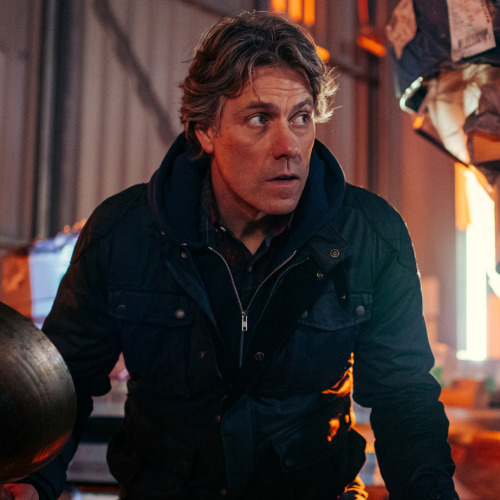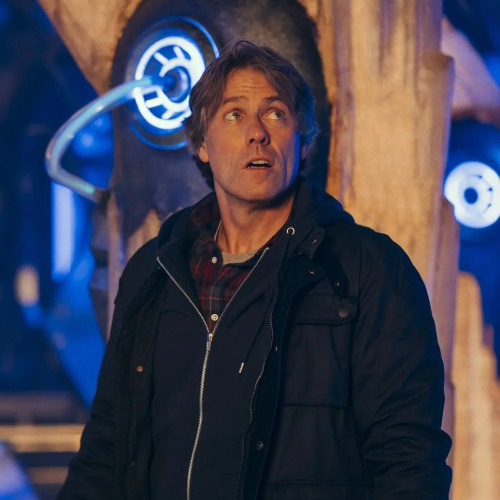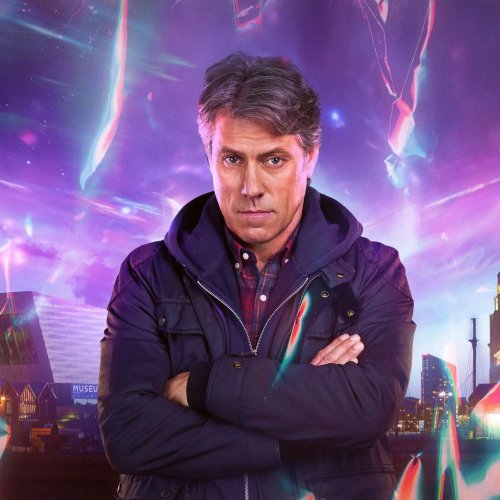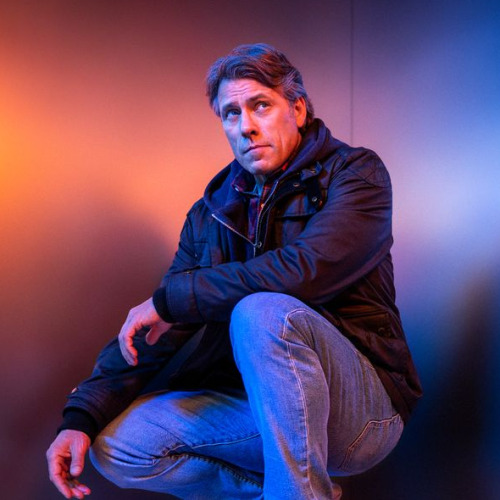#john bishop
Welcome to the TARDIS… ✨

They had beaten the Sea Devils, and he was close to working things out with his would-be girlfriend, but Dan would regret streaming the Champions League Final.

In a recent interview with the Radio Times, outbound Doctor Who showrunner, Chris Chibnall, stated that he expects Russell T Davies will ignore the changes he made while showrunner. According to Chibnall- “every era contains a contradiction or left-turn from what has come before.” Like when Moffat completely ignored the regeneration limit or the destruction of Gallifrey. Ignore the fact that in doing so, he also took into account the War Doctor and two Tenth Doctor regenerations, effectively making the Eleventh Doctor the Thirteenth Doctor. Or that the War Doctor and his future selves reversed the outcome of the Time War. Steven Moffat didn’t simply ignore what came before, he wrote something that worked within the parameters of the show. You know, like a writer.
It’s odd then that Chibnall should find himself on his second to last episode following a time-honoured tradition in Doctor Who reaching back as far as 1972. That tradition being the making of a Doctor Who story starring the Sea Devils that isn’t very interesting. Because let’s be honest, this isn’t exactly a sacred baddie. To the best of my knowledge, what most anyone likes about the Sea Devils is how they look. The sympathetic redesign of the Sea Devils leaves nothing to be desired, they look great. The good news is that the Sea Devils are no worse off than they were at the end of 1984’s “Warriors of the Deep.” The bad news is, there’s very little worth mentioning about “Legend of the Sea Devils.”
From the outside, this episode should be a winner. A beloved classic villain making its return for the first time in the new series, with pirates nonetheless! The problem here is that, much like the Sea Devils, Doctor Who has never really done a decent pirate episode before. If “Our Flag Means Death,” has proven nothing else, it’s that the pirating world is still rife with possibilities. Yet on Doctor Who, they always seem to fizzle (except “Enlightenment,” which owns ass, and I will not take questions). The pirates never feel particularly campy in this or even “The Curse of the Black Spot.” When you hear about the Doctor on a pirate ship, you want to get terrible dialogue and ridiculous set pieces. What we got instead were terrible dialogue and ridiculous set pieces. But you know, not like that.
Doctor Who has swashbuckling in its blood. Just look at Jon Pertwee or Tom Baker. David Tennant riding through a mirror on the back of a horse in front of the entire French court is as dashing as any pirate. The Doctor is a penniless explorer in a stolen ship crewed by wayward souls. She’s rubbed shoulders with the Corsair and fenced with a spoon. So why does this suck so hard? Probably the pacing, the writing, the plot, the structure, and the everything. I’ve said in the past that all I really wanted from Chibnall’s remaining episodes is that he fly under the radar, and boy howdy did he deliver. It would have been nice to expect some big dumb fun, but what we got was closer to big dumb boredom.

Right away you know something is off because everyone is stupid and vague. We meet “Madam Ching,” the pirate Queen of 1807. We don’t really get the giant obnoxious letters telling the location like we normally get, just the year. A father and son argue about stopping Madam Ching who is currently banging a MacGuffin dagger against a MacGuffin statue of a Sea Devil. It’s no question to the audience as to what is about to happen. The giant statue looks almost too big to be a Sea Devil, which is driven home all the more by the presence of a human figure in the grasp of the creature’s scaly fist. If this creature was frozen into a statue, was the human figure as well? Why didn’t they also emerge from the statue? Why were they so small? Was the Sea Devil killing a child? Did the child not survive the carbonite freezing process? Maybe someone added it later to make the creature more terrifying to ward off potential idiots like Madam Ching.

The entire scene plays out in the dumbest way possible. An older man, Ying Wai, tells his son, Ying Ki, to take over guarding the statue in case he dies. Ying Wai promptly goes off and dies. The Sea Devil, known as Marsisuss strikes him down. The magnetic whathaveyou of Marsisuss being freed pulls the TARDIS off course and draws the Doctor toward the action via her earring. Then, as if lying in wait, a floating pirate ship equipped with floaty green bits emerges from the sea, piloted by Sea Devils. What they had been doing in all that time is anyone’s guess. You would think that if your captain doesn’t reappear for about 300 years, the first mate might take command, eventually. It’s like Marsisuss left the car running with the window cracked and his kids are still waiting for him to return from the bank.

What may have been more illustrative, or even more engaging is perhaps Marsisuss needs to first awaken his troops from the sea. Maybe he needs to blow a conch that signals the reviving process and the Doctor tries to stop him. Instead the ship merely appears in the sky like Bowser’s airship. I say this not just because the ships are similar, but that they both have about as much setup. Despite the abrupt and unlikely appearance of Marsisuss’ getaway ride, it does at least look cool. Up to that point, the special effects had been somewhat lacking, so much so that my wife spent the first five minutes marvelling at how bad everything looked. But I honestly don’t mind when Doctor Who looks a bit naff. Like Nintendo, it’s not about the graphics. You want Playstation 5 quality, go watch The Madalorian. I knew the score though, they were saving most of the effects budget for the Sea Devils and their giant sea monster. It’s pretty standard filmmaking, that. Save the money for the important stuff.
There’s a sort of parallel between the Doctor and Madam Ching. Both are famous women travellers piloting a ship by themselves, which actually should be piloted by an entire crew. The parallel is strained by the fact that Madam Ching is so much better a solo pilot than the Doctor. It’s not a question of skill, but a mere observation of facts. We’ve all seen sail barges in movies. You don’t keep a ship crew for the company, these men all have jobs! No matter how much tenacity one woman may have, nobody could sail such a ship alone. If she is on the hunt for the Legendary Ji-Hun’s sunken treasure, she would need a crew to operate a bottom trawler. We’ve all seen these movies and read these stories. We’ve heard “Raise the flag and hoist the mainsail!” time and time again, so it rings hollow when we see something so physically impossible. It’s like Mr Plinkett says- “You might not have noticed, but your brain did.”
The Doctor and Yaz go off to have a bit of lesbian processing while Dan and his new friend Ying Ki are caught spying by Madam Ching. The Doctor’s plan is to go to the point where the treasure was lost at sea and rescue it before it falls to the bottom of the ocean, even though the Doctor illustrates that the TARDIS can actually sit at the bottom of the ocean with an air bubble protecting them. While back in time, aboard Ji-Hun’s ship, we see Ji-Hun forcing his men overboard and pledging allegiance to Marsisuss. The ship never actually sank, but was rather taken over by the Sea Devils and decked out with green floaty bits. They must have been proud of this visual because they give the ship three big reveals. It’s like “Star Trek: The Motion Picture,” in here. The Doctror and Yaz abscond back to the TARDIS just as a fight breaks out between Ji-Hun and Marsisuss. Landing at the bottom of the ocean, the Doctor finds no sign of sunken wreckage. Using the Little Mermaid ambience, the Doctor chooses this as the moment to flirt with Yaz a little.

At this moment, the ground begins to open and a giant sea monster emerges and captures the TARDIS within its mighty jaws. If only that thing could dematerialise. Luckily, this sea monster is no more than a glorified lift. I half expected a Flintstones gag where monster looks at the camera and says “Eh, it’s a living.” This wouldn’t be the first time Chris Chibnall has taken a big concept and reduced it to a means of safe transportation for the Doctor. They did that with the Weeping Angels too. It’s the worst kind of consistency. Set up without exploration. Your giant monster isn’t even a giant monster, it’s an elevator. Whatever.

Aboard the Sea Devil vessel, the Doctor and Yaz see Ji-Hun, still alive, but kept prisoner in a Tim Shaw type of thing. My guess is that Marsisuss must have been fully conscious while trapped in that statue. It’s the only reason I can think that he would just spill the beans of his entire plan to the Doctor. He was desperate for a bit of banter. His basic plan is to use something called the keystone, which is yet again, another MacGuffin to flood the earth using magnetism or some such nonsense. Ignoring the fact that there’s not enough water to flood the earth, what would be the point? Water covers over 70% of the Earth. Bro, you’ve already won. If you can’t control the planet from the majority of its surface, another 30% isn’t going to help. Maybe you’re dumb and your plan is dumb and you’re a bad leader. Your crew didn’t even know how to appoint a new captain. You’ve given them no guidance on what to do in your absence, so of course, you’re losing.

After realising the Doctor doesn’t know where the keystone is, Marsisuss decides it’s time for her to die. Before he can cut her down, the Doctor pulls a big switch that sends the ship to the surface of the water. During this time, we’re expected to believe that the ship resurfacing is enough of a distraction that Yaz and the Doctor are able to escape unscathed. Somehow, they are able to gain their bearings faster than the guy who actually knows the ship, and are able to swing from ropes to the safety of Madam Ching’s boat. It’s like when Yaz and Dan witness the Weeping Angels killing two old people and then are perfectly fine in the next scene. It’s almost as if they hope that if they throw this crap at you fast enough, you won’t have time to think about how stupid any of it was.
What comes next is arguably the best part of the episode. Finally, some actual swashbuckling! For a brief moment, the story remembers this is a pirate episode and we get some actual swordfighting. The Doctor even gets in on the action, which is great to see. In fact, Jodie Whittaker is on her A-game for this story. Unfortunately for her, the writers, Ella Road and Chris Chibnall were not. I feel sorry for Ella Road because so many of Chibnall’s deficiencies are on display here, that it feels unfair that she must shoulder the blame. We get the Doctor’s weird morality in the form of disgust that Ji-Hun may want to avenge his crew by cutting down Marsisuss. I say weird in that just moments later we see Dan cut down seven Sea Devils in two blows like he was straight from Grimm’s Fairy Tales.

Even worse than that is the moment where the Doctor lets Ji-Hun die in her place. Evidently, he deserves to die because he killed the guy who imprisoned him for 300 years. It’s as though Chris Chibnall took none of the criticism from “The Timeless Children,” to heart. The Doctor, who once gave one of her lives to save a companion she’d only just met, allows men to die as doorstops. Their sacrifice affording her a coward’s exit every time. When Steven Moffat received criticism for his writing, you would often see a meta commentary within the show, as if it were Moffat’s way of addressing the issues. There was a conversation going on. Here you see a cowardly writer writing a cowardly Doctor and refusing to admit any wrongdoing. I feel as though any restraint shown by Chris Chibnall at the end of Flux was more of a dictate from above, than any kind of re-direction. It feels petulant and selfish. The only way to redeem this kind of cowardice would be for it to be how the Doctor dies.

Speaking of the Doctor’s death, we get a bit of a glimpse into the future with the Doctor mentioning she promised Yaz a beach. I can’t help but feel this is foreshadowing of the Doctor regenerating on a beach. It’s already been established that the Doctor will not be regenerating aboard the TARDIS. The cynic (or realist who has eyes and has been writing about this shit for four years) in me thinks this is probably going to be some weaksauce attempt to recapture the emotion of Ten and Rose’s teary goodbye at Bad Wolf Bay. Only this time, instead of an established romance, you’ll get the tacked on gay tragedy of Thirteen and Yaz. And I don’t care if you’ve been shipping Thasmin since day one, the relationship has been all in your imagination. Even Chibnall admitted it wasn’t a planned storyline.
As you would expect from an unplanned storyline, the Doctor and Yaz’s romance subplot comes out of nowhere, gets barely explored and is gone immediately. It’s exactly what I’ve come to expect from Chris Chibnall- an idea is presented, they talk about it, nothing happens. That isn’t to say that either Whittaker or Gill do a bad job in this scene. There is a part of me that really enjoyed the Doctor finally saying out loud why she doesn’t do romance. Though you could also argue that it never really needed saying. We already knew it. But I guess Yaz needed to hear it, because the poor girl is about to pop. At this point, all they’ve done is made an argument for the healing power of a quickie.
All in all, I place this episode as the third in a sort of spiritual trilogy of Chibnall episodes. Right alongside “Dinosaurs on a Spaceship,” and “Arachnids in the UK.” The central theme being that the premises of all three episodes promise big fun, and somehow manage to bore me out of my mind. Not everything was a disappointment, however. The Sea Devils looked great and I loved the costuming. The Sea Devil’s swords reminded me of the knives people make from bismuth on Youtube. It’s a cool way to make something look more natural while still other-worldly. I loved seeing the Doctor do a bit of action and drama. But the characters are so ill defined that I found it difficult care about anyone or anything. Madam Ching is a cool pirate, but other than that, she’s giving me nothing to work with. So when she and Ying Ki ride off into the sunset, I forget about them completely. In fact, I forgot most of this episode the moment it ended.
I wanted to save some room here at the end to talk about the end. Not of this episode, but rather, this era. If you hadn’t noticed, I haven’t written anything since the New Years Day special, and with good reason. I’m tired of writing about being disappointed. Granted, I could write about any other era, but mama needed a break. The tagline on this blog is “One girl talking about the shows she loves,” which is true, but not lately. I point this out because I feel like it’s important to illustrate the journey I’ve been on with Chris Chibnall’s Doctor Who. The excitement for a female Doctor inspired me to start writing these articles. Now my lack enthusiasm for Chibnall’s idiotic brand of cruelty has left me drained. In fact, the biggest points of excitement I’ve had for the show have been about things beyond this era. Reading that Russell T Davies intends to return to a new series every spring filled me with joy. Far more than the revelation that one of my favourite companions, Ace, will be returning in October. With any other writer, I would be ecstatic.
Sure, it’s almost over, but we’ve seen the kind of damage Chris Chibnall can do with a single episode. Now he’s dragging one of my favourite companions into his mess? It’s like one last twist of the knife. I have loved writing for you all, but I have not loved writing about Chris Chibnall. I cannot wait to be excited for Doctor Who again. I cannot wait for this all to be in the rearview mirror. I used to speculate as to what certain clues meant, but lately, I just don’t care. Why speculate when it’s going to lead somewhere vague and depressing? Do you really expect Chibnall to give the Fugitive Doctor a satisfying character arc with only one episode left? With the reintroduction of Vinder, do we once again need to worry that bellend is going to introduce the Doctor’s parents?

Showrunners don’t outright ignore bits of Doctor Who that don’t suit their version of Doctor Who, they ignore the mistakes. We should ignore things like the Doctor being half-human on his mother’s side. We should ignore the times the Doctor’s age fluctuates back and forth. We should ignore the Twin Dilemma. But never in all of Doctor Who have I seen a bigger call to ignore an entire era. This is a real damn shame because I love Jodie Whittaker. I’ve heard fans suggest they bring Capaldi back for a new regeneration. I feel like that would be a mistake. Losing both Jodie and Jo as the Doctors would be a great loss, in my opinion. I don’t think it’s fair to the people who are fans of this era to do away with it. But if someone found some way to fix this mess, I would love to hear it. If RTD can’t fix this, I hope he does ignore it.

In 2005, psychologist Barry Schwartz gave a TED Talk in which he posited that perhaps the best way to avoid disappointment is to lower your expectations. It’s a life lesson I’ve found very helpful through the years. Over the course of the Chris Chibnall era, it’s become the only way to watch Doctor Who. Every time I get excited, I end up feeling burned. My zen has come in the form of expecting nothing and being pleasantly surprised when it turns out well. The concept of another New Years Day special with Daleks was not one I met with much anticipation. There were even moments when I forgot about the upcoming episode. Because let’s be real, there wasn’t a lot to get excited over. Another Dalek story for New Years Day? Not exactly breaking new ground. So was I pleasantly surprised? No, not really. But I did have a good time.
If there is any hope I have left in the remainder of Chibnall’s Doctor Who is that he shoots for mediocrity. It’s practically the man’s wheelhouse at this point. That isn’t to say, however, that Chris Chibnall is not an ideas man. He has loads of ideas. The thing is, being an ideas man is the easy part. It’s exploring these concepts deeper than the initial premise that makes something truly thoughtful. So when I heard that the holiday episode would be a love story with a time loop and Daleks, it played out in my head pretty much exactly as we saw onscreen. It’s hard then to temper expectations when the premise is about as deep as it gets. With ideas left this unexplored, premises count as spoilers.
This is why I always go back to my number one litmus- was it fun? And the answer is- “Kinda, yeah.” I kind of had fun watching last night’s Doctor Who, and I am going to chalk that up as a win. It’s been a particularly depressing winter with the omicron variant, and a new Doctor Who episode was very welcome. Ultimately. “Eve of the Daleks,” had very little it needed to do other than be more Doctor Who, and with that, it succeeded. You cannot say that it did not begin and end. The cherry on top is that there were also moments of pure entertainment in this disjointed, but ultimately satisfying episode.
Setting the story within a multi-floored storage facility works for Doctor Who. They did it in the Twelfth Doctor comic “Space Invaders!” and it was about as exciting a location as it was then. But Doctor Who has always been about the mundane meeting the absurd, so I like it. It’s also a rather cheap way to do an episode, which is not at all a criticism. With Sony owning Bad Wolf, our days of quaint low budget Doctor Who may be behind us. We should take a moment to appreciate the fact that Doctor Who comes from a long line of people trying their best on a shoestring budget. We may make fun of it, but if Doctor Who is going into the territory of competing with Disney+, it’s worth appreciating its underdog status.

Our two new leads, Aisling Bea’s “Sarah,” and Adjani Salmon’s “Nick,” aren’t your typical run of the mill side characters, and I appreciate that about them. Their initial “meet cute,” is still rife with cringey hamfisted dialogue, especially at the beginning. The desire to have the characters simultaneously espouse exposition while developing their awkward chemistry was a bad start that left me with a feeling of unease. Aisling Bea does a good job of lending depth to the apathetic Sarah, who inherited the storage facility as more of a burden than a boon, but even she can’t make exposition sound natural.

The Doctor, Yaz, and Dan, have finally decided to address the dying TARDIS. Once again, the premise of a dying TARDIS goes left unexplored. Was it to do with the Flux? Did Swarm and Azure sneeze on the console? The answer remains a big fat “Who the hell knows?” What we do know is that evidently resetting the TARDIS back to factory settings is enough to expel the black gunk and white spider-web infecting the TARDIS out from its system. It’s a rather underwhelming solution to what was one of the better mysteries during “Flux.” All this really does is allow for the time loop to exist, which is about as deep as the concept goes. They may yet still address this in Jodie’s final episode, but after Dan confirmed that they weren’t going to explain how the Doctor saved the universe after the Flux destroyed most of it, I very much doubt it. Underwhelming solutions aside, the scene of them leaving the TARDIS as it begins to pull apart was one of the best visual moments in the show’s recent history.
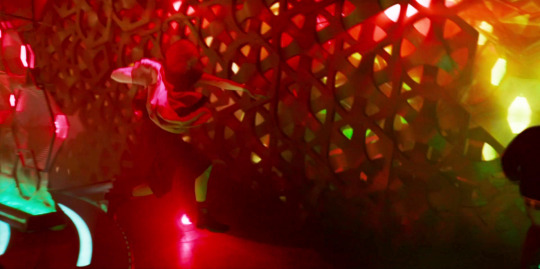
Having sensed the Doctor’s presence, the Daleks have arrived to dish out a bit of revenge for the Doctor’s attempted genocide of the Daleks. Leave it to Chris Chibnall’s Doctor to not only address genocide, but the brag about it. That tracks with the rest of his morality which is mostly all over the place. The Daleks have trapped the Doctor and everyone else in the storage facility with a sort of force field. But as it would turn out, the Daleks are also trapped in the time loop, and thus, also forced to repeat the events of stalking the humans within the building, and lighting them up with their new fancy guns. Though these Daleks died, they died living the Dalek dream of killing the Doctor over and over. Had they survived, they’d have been legends among their kind. Every Dalek wants to plug the Doctor, but getting to do it over and over? Priceless.

Truth be told, I found a lot of the time loop confusing. It took piecing it together with friends for me to even realise it wasn’t the Daleks making the loop happen. We came to the conclusion that we’re pretty sure it was the TARDIS repairing itself that was creating the time loop. Though it doesn’t seem to play by it’s own rules. At one point, the worry is that Nick won’t survive another loop if he dies before the next revolution. They keep losing a minute per revolution. But they’re not losing minutes from the future, but minutes from the past. It’s always one minute ahead. So how exactly would dying within the first minute not be more catastrophic than dying within the last minute? Even more, why do the Doctor and the TARDIS crew always appear right outside the TARDIS and not where they were a minute or two minutes from the TARDIS? How are the Daleks able to teleport into the facility to whatever location they choose, and not their initial location? If a Dalek is able to teleport into the building, how come they can’t teleport past a storage unit’s shutter? I take it this has something to do with the fact that the Daleks were reacting to the position of the Doctor and thus teleporting in after the fact, but if they’re losing a minute every time, it would catch up to their position.

These questions are as useless as any with Chibnall’s writing. We’re just supposed to be impressed because time loop. Which in some ways I am impressed. I like when anyone tries to do neat things with time in Doctor Who. One of my favourite First Doctor stories is “The Space Museum,” simply because it’s one of the few early stories to play with time as a concept. Never mind that the last half of the story is a bit of a snoozefest, it’s still cool to see them experimenting. Doing a time loop/Groundhog Day/Russian Doll storyline is exactly the sort of thing I like to see them do in Doctor Who. It’s still a bit of a Dr Strange meets Dormamu moment, which is in keeping with Chibnall’s penchant to copy the MCU’s homework. That man just really cannot catch a break.
You have to hand it to Chris Chibnall, though. He said no more Christmas episodes, and he really meant it. The decision to move the holiday special from Christmas Day to New Years Day has not gone without controversy. I myself have always sided more with Chibnall, which is weird to say. I find the idea of seeing the Doctor regenerate on Christmas, acting their ass off while a robot Little Drummer Boy terrorises Cardiff or wherever, a bit distracting. But I also see the reasoning behind it being nice to watch a little Doctor Who after all of the presents have been opened. A bit of daft entertainment is appreciated. The day after New Year’s Eve doesn’t feel as special. A bit of the Doctor while you nurse a hangover feels more like a bank holiday. What’s even weirder are the Christmas elements such as the belaboured “elf storage,” joke on the signage.
Speaking of jokes, it was reported that this episode was meant to be a sort of comedy. Other than the “elf storage,” gag, I can’t remember much comedy. No more than usual, at least. In the words of Homer J Simpson- “I didn’t hear anyone laughing, did you?” If Aisling Bea’s dialogue was meant to be funny, I think I now understand Chibnall’s morality, because for the most part, she was awful. It’s all well and good that she’s multi-faceted, but I found her extremely unlikable. Nick is presented as a guy who’s supposed to be weird in a quirky way, but it comes off as creepy. This isn’t becuase he clearly turns his exes into lamps, but because he is able to form a crush on a woman he sees once a year. I can buy that he is too nervous to talk to Sarah, but if I went into ASDA once a year, I’m not going to form an intense crush on the girl at the customer service counter. I feel like Chibnall is the kind of guy who thinks “Love, Actually,” is this really wholesome classic. Nick and Sarah behave like people from a romantic comedy, and I hate that for them.

Not to be left out, the Doctor gets one badass moment to counterbalance her genocide brag. I loved her delivery of the line when she says “Daleks answer to me.” I’ve said it before that Jodie Whittaker has finally found her groove as the Doctor. It’s sad then that they give her the same lame-ass faux inspirational speech at the end of the story. Something about Chibnall’s speeches always feel forced and unearned. He lacks the ability to write a solid monologue that doesn’t leave Jodie sounding like she’s speaking to school children on Blue Peter. There’s a sort of sappy earnestness that rings hollow in those moments. I much prefer the Thirteenth Doctor when she’s a little snarky, if not also a little angry. Luckily, she’s managed to find that within the character, even when Chibnall cannot.

We’re still getting moments where the action stops dead in its place for the characters to say exactly how they feel before moving on. I had begun to think Chibnall had gotten better at these moments, but Dan pulling Yaz aside for a very special Doctor Who moment that gets real about issues and junk, was Chibnall back at his worst proclivities. I do, however, appreciate the line where Yaz says “I’ve never told anyone, not even myself,” simply because it’s real to a lot of LGBTQ+ experiences. We don’t always know our feelings until they creep up on us. That was a better bit of representation than “I’m gay and now I’m dead,” which has permeated Chibnall’s run. Though Yaz’s story remains the same old tired trope of gays cannot be happy. The Doctor will never return her advances because the Doctor never does. I hope Bill and Puddle girl show up last minute and form a triad with Yaz. That’s my headcanon.

Dan easily has one of my favourite arcs throughout the story. The Daleks write him off as a bit of a dullard compared to the Doctor and Yaz. I liked seeing Dan fool a Dalek while avoiding its gun by running around it in circles. I mean, sure, a Dalek would have figured out turning the opposite direction, but I’m gonna give our man this victory. Dan continues to remind me of Jamie McCrimmon in his “simple but not stupid,” approach to life. He adds much-needed levity to the story. He’s the Graham of this iteration of the TARDIS- practical and elevating what is on the page with a charming performance. Dan is by far my favourite thing of this era, and also this episode. John Bishop gives a gem of a performance.
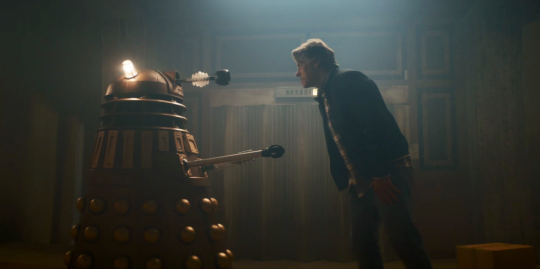
The Daleks continue to hunt down the Doctor and her friends loop after loop. Though they do get in their licks, like when Nick destroys both Daleks with their own crossfire. I guess they learned nothing from “The Day of the Doctor,” when they shot eachother after Gallifrey disappeared. After dying enough times for it to lose all weight, the Doctor begins to piece together a plan. After discovering a part of the building not blocked in by a forcefield, they manage to lure the Daleks toward some explosives left by some mad lad only known as “Jeff.” By the look of things, Jeff works for the storage facility and uses it to store what I can only assume are the components of his highly explosive meth lab. They set up early on that Sarah’s phone can’t be put on silent, which never really makes any sense to the rest of the story. It does, however, remain consistent with Chibnall’s understanding of technology. The phone is used as a means to fool the Daleks into believing there is a human worth shooting behind loads of explosives. Evidently the Daleks can scan for signs of the Doctor within a storage facility, but not the presence of butane in a canister. Sarah’s mum calls just as the clock begins to count down to midnight, causing the Daleks to destroy themselves and the building.
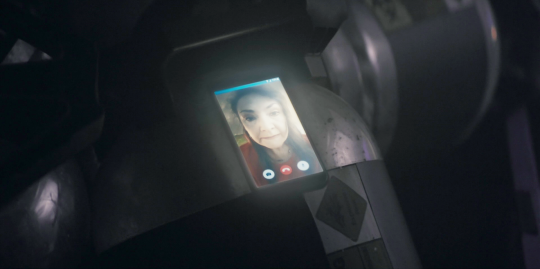
As the smoke and debris dissipates, we see the TARDIS once again in her blue glory. No longer are her surfaces covered in glowing pink cracks. As our heroes open the door, we wonder what we will see inside. Will there be a new console room perhaps? Maybe it has reverted to the original TARDIS console room from the First Doctor era. Well, as it would turn out, nothing has changed. They even kept the obnoxiously obtrusive quartz time rotor. What a total letdown. I didn’t fully expect the TARDIS to get a new console room, considering just how close we are to the Fourteenth Doctor and RTD2. But nothing? I really gotta say, that was a major flop of a reveal. Even using the First Doctor console would have been something. We’re given no new information, and nothing has changed.
This has been a major issue of the Chibnall era. Most of the intrigue derives from the unresolved as opposed to the unexplained. These aren’t mysteries we’re left with to ponder, but issues left unexplored. And it’s true, despite this review, I did enjoy the episode, but I needed to illustrate to what degree. When the bar is as low as “The Timeless Children,” anything above that is enjoyable. Chibnall’s greatest successes are among the mediocrity of other, better writers. To be honest, the part of last night’s episode that left me most excited was the revelation of the Sea Devil for the next story. I’m excited for the next episode, but not because of what came before it, but because I love the Sea Devils. I enjoyed last night’s episode for possibly the worst reason- it was fine.

Last week I needed a bit of a winge. I allowed myself a mask-off moment where I could just say what I felt. For the first four episodes of Flux, I resisted the urge to utterly tear into the show. I deleted so many opening paragraphs. I resisted every urge to write one-line articles simply saying- “I really disliked that.” I drew some ire from a few of you, and that’s fine. This blog is about my experience, and I’m ok with you disagreeing. I like to think that those of you who read these, do so because I take strides not to impose my views as the only true way to enjoy Doctor Who. When other people do that, it really irks me. But I still needed to let off some steam. I’m glad I did so because this week, I feel a bit better. Not about Flux, but as a fan. I’m glad I got to get all of the frustration out so that I could look at “The Vanquishers,” through sober eyes.
Flux had given me a bit of an identity crisis. I was trying to give Chris Chibnall some room to pleasantly surprise me. This indulgence arose from a genuine desire for the series to succeed. My desire to enjoy Doctor Who put a lot of objections on stand-by. Because of this, I couldn’t tell if I was being unfair, or if it was really that bad. “The Vanquishers,” cleared all of that up for me. I did not enjoy most of that, and a huge portion of it led nowhere. You go through a phase during a bad movie where you stop hoping it will turn out good, and realise it’s actually rather bad. Last night I was struck by a moment of clarity where I found myself thinking “This is how I must have felt watching ‘Batman and Robin,’ in the theatre.” But then I started thinking “No, ‘Batman and Robin,’ was at least somewhat campy and fun.” This was just a mess.
Much like Steven Moffat did in “Twice Upon a Time,” Chris Chibnall has allowed himself a few moments of metatextual commentary for his last series finale. Sadly, I’m not sure all of it was entirely self-aware, like when the Doctor says “It’s quite draining, and confusing, and breaks every known law of every known… everything.” It’s a great way to explain his approach to tying together so many loose ends. Using the conversion plate that had stabilised the Doctor’s body for her meeting with Tecteun, Chibnall was able to split the Doctor into three different bodies in order to tackle this hulking mess of a narrative. Even with three Doctors on the case, the episode still stumbles from location to location, resting long enough to deliver crucial and convenient dialogue. No idea is left explored.
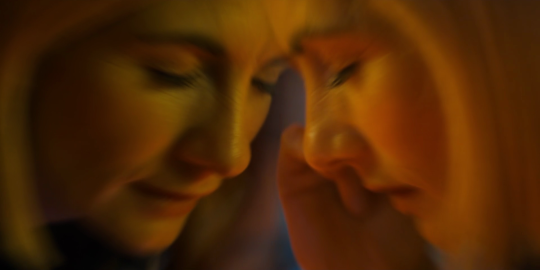
Let’s pick up with Diane and Vinder, still stuck in the prison form. I think it’s important to mention that despite their wish.com masks, I rather like the concept of the prison form. And my objection to Diane being precisely at the doorway when Vinder walked in was slightly quelled by the revelation that she was the last remaining person inside. Where they all went is never really explained, but it does at least explain why she’s the only person Vinder might meet. What she was doing hanging out by the entrance is still anyone’s guess. Vinder and Diane have a clever sequence where they use the edges of the artificial environment to escape. I say clever from their standpoint, not from a designing an inescapable prison standpoint. Evidently, this is a bit of a design flaw to the point that escaping a prison form was part of Vinder’s training.

One of the Doctor’s three forms allows her a moment to meet back up with Yaz, Dan, and Jericho after their three years of travel. She even got a moment to see Kate Stewart and the Mad Mole. Did they ever explain how the Weeping Angel town went from floating in space to back to normal? If they didn’t I have questions about how the three of them were able to travel the earth in search of the dumbest line of dialogue ever. Kate is no longer working as the leader of UNIT, but rather as the leader of Human Resistance Against Sontaran Occupation. Evidently, the Grand Serpent was infiltrating UNIT in order to remove them from the equation, so that the Sontarans could meet humanity with little resistance as possible. I guess they forgot the power of a drywaller with a wok.
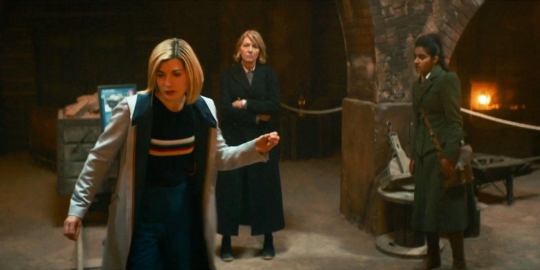
The Sontarans are a weird readdition to the storyline. Who would have guessed that after “War of the Sontarans,” they would show up again, and as the biggest villains, no less? Chris Chibnall had said he planned to make them more fearsome, and he somewhat delivered. When they weren’t stupidly sleeping at the same time, getting their asses handed to them by pensioners with cookware, or going cuckoo for Cocoa Puffs, they were pretty formidable. As it would turn out, the story Flux was telling was about the Sontarans. Who would have guessed? No seriously, who would have guessed this was all leading to that? All this addition to the storyline really did was explain why the Sontarans were there in the first place. Their plan was basically to draw the Daleks and Cybermen to the Flux under a false truce. The Flux would destroy their greatest enemies while they remained shielded by the Lupari ships. With their competition out of the way, the Sontarans would be able to reign supreme.
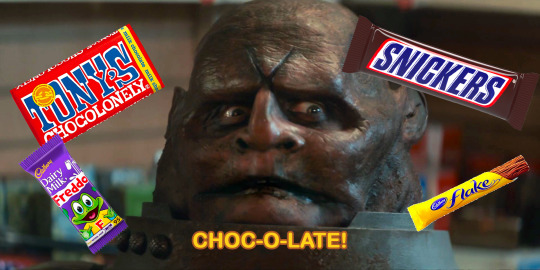
The Sontarans use both Claire and Jericho in order to find out the exact time and date of the Flux for their little plan to work. Evidently, both of them have enough psychic ability to foresee this event, which is weird considering the Flux has been going on outside the Lupari shield for six weeks now. None of this holds up when you think about it for more than five seconds, which screams “first draft.” What are the Lupari ships made of that they can ward off the Flux? Why do the Lupari give a damn about humanity? How was Vinder’s planet left in ruins when we saw the Flux destroy entire planets in the first episode? Why do the Lupari ships block the Flux, but not the sun? If the Flux is anti-matter why does it put things into flux? Also, and this is a personal gripe, why use anti-matter and the beginning of the Time Lords and never once mention Omega?

The way in which the Flux moves only further illustrates how ill-equipped Chris Chibnall is at writing the science part of science fiction. We’re supposed to believe that this Flux has eaten so much of the universe that only a small portion of the universe remains. The speed at which the Flux travels vs. the size of the known universe leads one to wonder just how long the universe had been dying. This storyline would take so long that it would have been present during every incarnation of the Doctor. In series four, we got alien invaders after their planet was stolen by the Daleks. Where are the refugees of the Flux? Why is nobody freaking out? What do the people on earth have to say about the fact that the planet is surrounded by Lupari ships? Where are the shots of people coming out of their houses and looking up into the sky? It’s almost as if the concept wasn’t properly explored. Hence, my implication of this being the first draft.
The Grand Serpent’s place in all of this is to benefit from the Sontaran plan. In other words, he’s a bit of a write-off. The Doctor implies during a scene with the Grand Serpent that he must have been some genocidal dictator in his past. This is rich considering that the Doctor aids in a total of three possible genocides in the story. We’re led to believe that the universe is now empty, so any Daleks or Cybermen present are presumably the last, as are the Sontarans. But not only is the Doctor willing to let the Daleks and Cybermen die, she’s also willing to use them as bait to take care of the Sontarans. She even gets Jericho, a person who witnessed the Holocaust, to aid her in triple genocide. It’s Chris Chibnall’s weird mean spirited writing rearing its ugly head again. This is the same Doctor that left a brown man in the hands of the Nazis. All of this is justified because of a fourth genocide of the Lupari that happened off-screen.

Reviewing this episode has proven to be a challenge, as it is so awkwardly paced that it’s hard to remember when certain things happened. Not only is the Doctor jumping around from story to story, but so is the pacing. You could argue that the lockdown was a contributing factor to the mess that is the Flux. Chris Chibnall had originally planned to pace this story over ten episodes, rather than six. I would say he did his best, but nothing about this feels cut for time. Had he edited out the superfluous excess, we would never have met Bel and Vinder, because, let’s face it, their storyline was ultimately as useless as it was boring. While I think they’re fine as characters, did we really need to spend so much screen time watching them do nothing? What about any of their story couldn’t have also been done by Yaz and Dan? Why was Kate Stewart involved? Why was John Williamson there? Why was the Grand Serpent involved? What narrative function does Diane perform? Wouldn’t suggesting the Doctor feed the Flux with the matter inside the prison form make more sense coming from Yaz?

I had read that the Grand Serpent came about from Chibnall’s desire to work with Craig Parkinson. But why introduce a whole new character? Why not just have him play a Sontaran? Why bog down an already bloated script with yet another complication? This isn’t like when David Lynch changed Twin Peaks forever with the late addition of Killer Bob. This is just irresponsible writing. The only thing the Serpent truly manages is to pull UNIT into Chibnall’s web of broken canon. UNIT wasn’t formed in the ‘60s by Alistair Gordon Lethbridge-Stewart after the events of “The Web of Fear.” No, it was evidently formed in the ‘50s by General Farquhar. Having this many unresolved plotlines in the final chapter of your epic adventure is a bad sign. Each new storyline should elucidate upon what came before it, but instead, we’re just left with questions. I’ve touched on this before, that Chibnall’s writing leaves you with all of the wrong questions. These aren’t questions pondering the greater mysteries of the story, but rather what the hell just happened and how any of it was important.
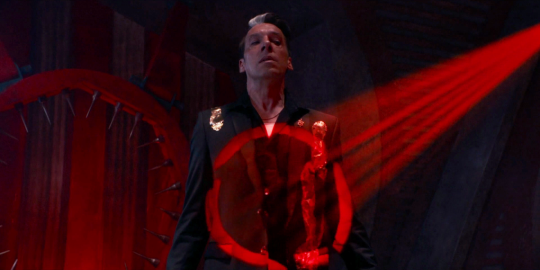
Swarm and Azure’s storyline was also a bit of a write-off. As much as I really enjoyed their performances throughout their series, they never really achieve anything and spend the whole time posturing like cats. Their desire to destroy the universe over and over seemed like a good way for them to put the universe back at the end, but instead, they just die like dust at the hands of what I’m guessing was the personification of time. This isn’t before they tease the Doctor with her fob watch, which also doesn’t behave like its supposed to. In the past we’ve seen these fob watches open and restore the Master, the Doctor, and Ruth all back to Time Lords. But when the Ravagers hold it up to the Doctor’s face, it’s just a bit of torture. For some reason, when they threaten to dissolve the “Cabin in the Woods,” poster house, this also causes the Doctor to dissolve, which I guess makes sense. It doesn’t really, but once again, whatever.
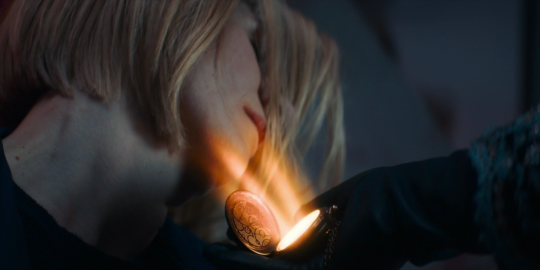
The best part about the fob watch is that the Doctor drops it down into the bowels of the TARDIS. When she did that, I said out loud- “Oh thank God.” I couldn’t wait for them to destroy that damn thing and the misguided narrative that comes with it. Steven Moffat teased that he would reveal the Doctor’s name, only to pull back at the last moment. You get the impression that that’s what Chibnall thinks he’s doing here. While I am grateful that he allowed some mystery to remain, it feels less like character development, and more like damage control. After “The Timeless Children,” any restraint on his behalf feels more like a mandate from on high than any sort of artistic integrity. In this way, Flux feels less like the latest thrilling chapter in the Doctor’s adventures, and more like a “what if,” scenario. What if the majority of the audience had wanted to see more of the Timeless Child storyline? What if lockdown had never happened? What if Chris Chibnall had never been sacked? They’d have opened that watch, is what.

Like much of this series, it reduces the bulk of the Chibnall era to a write-off. What’s most frustrating is that, once again, we’re left with yet another finale that explores none of the things in which many of us are even remotely interested. We got close to no new information about the Ruth Doctor. I expected her story to come into focus, but she was completely missing from the story. On top of that, the TARDIS remains infected. The promotional art for the holiday special implies that the TARDIS is still broken and that maybe the Doctor is going to finally do something about it. Though I must say, the TARDIS’ infection was about as consistent as Ryan’s selective dyspraxia. In one story, the TARDIS door’s dimensions are grossly out of whack, and in other moments, it’s running like a finely tuned machine. Diane and Dan don’t end up together out of plot convenience, completely undermining Diane’s agency by turning her into a heartless jerk. Jericho was sacrificed for the cause of genoicide. Looking back, last night’s episode has completely disabused me of any notion that Chris Chibnall has improved as a writer.
One area of improvement across the entire show has to be Jodie Whittaker. This was easily my favourite season with her. And I will admit that Chibnall did give her better dialogue. It’s just a shame that it was bogged down by so much stupid exposition and questionable morality. That being said, I really enjoyed her in this episode. She really feels like the Time Lord we know and love. There were even moments where she was reminding me of Tom Baker’s alien weirdness. I hope that people who hated the concept of a female Doctor can now see this. From the memes and reviews I’ve seen online, the general consensus is that she’s a great Doctor who has sadly been bogged down with some of the worst writing in the show’s history. She’s modern Doctor Who’s Colin Baker, and I can’t wait to hear her absolutely rock shit in her audios.
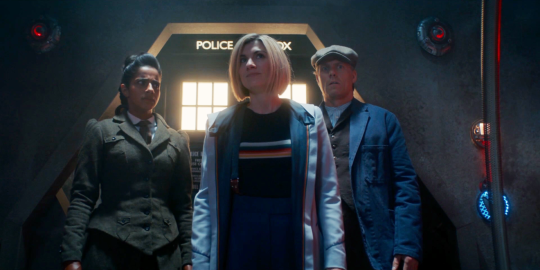
Usually, I have more positive things to say about a story, but really, my favourite thing about this storyline was that it wasn’t as bad as I feared. It was bad in that it was a poorly written piece of mediocrity, but it wasn’t bad in a way that does lasting harm. “The Wedding of River Song,” was a jumbled mess, but it doesn’t ruin Doctor Who. I’m glad that Chibnall was kind enough to walk back some of his concepts in a way that allowed them to re-establish some of the mystery. This doesn’t change the fact that the Doctor being the first Time Lord is already far more information about her past than I ever wanted to know. My friend Taryn refers to it as “an idiot’s idea of clever writing,” and I can’t help but agree. That being said, it is nice to know that the way in which it ended leaves open a couple of different ways to retcon this mess into something salvageable. If Chibnall plays the next three episodes safe, then they might actually end up enjoyable.
We’re left now with a universe in tatters (in more ways than one). Evidently, the Daleks aren’t all dead because they’re going to be the villains of the holiday special, again. That’s about as exciting as the prospect of someone digging that fob watch out again. We managed to miss a few bullets, for which I am pleasantly surprised. Bel and Vinder aren’t the Doctor’s parents, yet, which was a great relief. And yet I find myself in the same position I was before “The Vanquishers.” It’s hard to rest with three episodes of Chibnall’s Doctor Who left. There are still too many balls in the air for me to feel like we’re past the worst of it. Part of me hopes that the reason the Ruth Doctor hasn’t been fully explored yet is that she’s set to become the Fourteenth Doctor. Part of me worries it’s because Chibnall is saving it for yet another unfulfilling finale. All I really want from Chibnall at this point is to do what he does best- aim low and fly under the radar. Please, Chris, leave quietly.

For the past 58 years, Doctor Who has introduced some novel concepts. The police box that is bigger on the inside. The traveller through time and space who dies and regenerates. But I don’t think we’ve ever had an episode where the title of the story is a direct reference to the fandom. Because isn’t that what we all are at the moment- “Survivors of the Flux”? I’m barely holding on at this point. You’ve seen me go from cautiously optimistic to beat down. I believe that if you were to compare that to stages of grief I’m somewhere around acceptance. I am the antelope saying to the lion- “Fine, eat of me.”
I’m being dramatic, of course. Think of it as a reaction to hunger. I need to “eat,” the Doctor Who equivalent of a Snickers. I’ve definitely run a marathon, and I have a Mighty Jagrafess of the Holy Hadrojassic Maxarodenfoe sized thirst. My point is that I’m having a hard time approaching this objectively. I don’t know what’s good Doctor Who anymore. I’m an anaemic mess trying to subsist on more sizzle than steak. But that’s enough with the food puns. I’m stalling. The fact is, I’m not happy, and I don’t want to be one of those internet turds constantly harping on Doctor Who. I also don’t want to be a lyre (I’m moving on to music puns). If you are enjoying where Doctor Who is heading I would like to know who your weed guy is.
They say that if kids are enjoying Doctor Who, then Doctor Who is doing ok. But I don’t know any kids. All I know are stunted adults obsessed with a kids show and we’re all fucking depressed. “Am I so out of touch? No, it’s the children who are wrong.” If you know any children, ask them what they thought of last night’s Doctor Who and send it to my P.O. box. Part of my dilemma with objectivity stems from having watched Jay Exci’s eight-minute parody of the 13th Doctor era before last night’s episode. Every time they changed locations with that horrible font, I couldn’t help but hear “This living room is in Hawaii! Wow, what an international adventure we’re having!” It’s sad how easy it’s been to nail the Chris Chibnall era by going with the simplest explanation. I called the Timeless Child in my review for “The Ghost Monument.” I called Tecteun in my review for “Once, Upon Time.” And people are most likely correct about Bel and Vinder.
Going by this rubric, I’m going to predict that the Grand Serpent’s mark is a reference to Jon Pertwee’s snake tattoo. The Division’s brand on the Doctor after the Ruth Doctor regenerated into the 3rd Doctor. Do you think they’ll get Sean to play his dad? I’m assuming this because, much like “I’m half-human on my mother’s side,” the Doctor’s tattoo is definitely something that needed an explanation. We couldn’t, you know, ignore those things. It’s ironic that Chris Chibnall seems to be the retcon guy, considering how much of his era will be retconned. Or, much like the Doctor’s parentage should have remained- simply ignored. Of course, I am still staking my entire objection on speculation, but so far, I’ve been spot on. Every bit of wiggle room we may have left for mystery has been joylessly explained away. Was the Master telling the truth? Yes. Oh. Ok. Is Tecteun telling the truth? Doesn’t matter. Her narrative function has been replaced by a watch.

I mentioned that one thing I was worried about with these cliffhanger endings was that it was going to result in a string of endings that look great visually but are resolved within moments of the next episode. I called the idea of the Doctor transforming into a Weeping Angel new territory, which was exciting. But the moment we see her in the next episode, it’s just a prank on the Weeping Angel’s behalf. If you spent the last week itching to see how the Doctor gets out of this mess, you’ll be relieved to know that is was super easy. Barely an inconvenience. The Weeping Angels were just clowning on the Doctor. They needed her frozen in carbonite so they could safely bring her to the emperor. They put a little badge on the Doctor that stablises her body on a quantum level. On it, is the same tree motif of the Division.

The Division is a sort of… time variance authority. They’ve got a guy who stands outside of time that hides behind a giant cloud of destruction. It’s not at all a Marvel show. They don’t own the multiverse, ok? I saw an article last night that said “Survivors of the Flux,” confirmed a fan theory about there being a multiverse in Doctor Who. Yeah, it’s a totally new concept. We never saw the Brigadier with an eyepatch. And Rose definitely didn’t find herself on a beach in an alternate universe. This is all new, evidently. The beauty of Chibnall enmeshing the Timeless Child so deeply into a multiverse is that that’s where we can leave this story in the future. In some B-universe where stupid idiot things happen.

Another issue I am having is that I don’t know who the villain is and at this point I’m too afraid to ask. Two of the big baddies- the Weeping Angels and Tecteun have both been neutralised. Tecteun was reduced to dust while the Angels have been reduced to underling agents of chaos. I mentioned that the Division has Swarm and Azure, but I was just using that to make my snarky MCU joke. Tecteun actually seemed rather bothered by their presence on her swanky space station. I know that David S Pumpkins dude is part of it somehow. He’s now infiltrating UNIT, which is a part of this already heavily bogged down story. By episode five, we should be getting a lot more answers, not introducing brand new concepts. Not since the Star Wars prequels have I seen such an ambitious plot completely get lost in its execution. But hey, at least we got a shot of Kate Stewart for the trailer last week.

Kate’s main function in this episode is to explain everything we just saw the Grand Serpent do and to resist his toilet snakes with a force field. It’s always nice to see Jemma Redgrave make an appearance, which is why it’s a bit of a letdown that she’s only in it for about 5 minutes. An aspect of Chris Chibnall’s writing I’ve praised in the past is how he makes little nods to the past. But anymore, they’re starting to feel like those Memba Berries from South Park. “Memba the Ood?” “Yeah I memba!” It’s like when a DJ plays snippets of good songs in one big mess of a remix. Nothing is enjoyable, only a reference of something that was. Flux is playing Doctor Who’s hits, but not fleshing any of them out enough to be satisfying. What if the Doctor was a Weeping Angel? We’ve got no time to explore the concept, but here’s what it would look like.

The Doctor’s past memories are stuck in a fob watch, much like they were in the two-parter- “Only Human,” and “The Family of Blood.” The chameleon arch is a well established bit of Doctor Who lore that can be used to great effect. When Professor Yana was revealed to be the Master held in a fob watch, it was a grand reveal. Knowing that the fob watch held by the Division contains the entirety of the Timeless Child storyline, I wonder if we might not instead just throw it into the Flux. The only one who cares about the Doctor’s past at this point is the Doctor. I certainly don’t. At least, not like this. We’re watching the systematic removal of mystery from the core of a show with a question at its centre. Please stop trying to explain things nobody has the right to answer.

Yaz, Dan, and Jericho are off having an adventure in the year 1904. You’ll know it’s 1904 because every time we change locations, that ugly font tells us it is. How about you just let us know if it becomes 1905. If you recall from last week, they were sent to 1901, which has given them 3 years for Yaz to find the perfect hat. It really goes to show how much cheaper stuff used to be. I’ve been living in the same timeline for 38 years, and I still can’t afford to travel the world. They find a cup in Mexico, which leads them to Constantinople, a place known for deciphering the writing on ancient Mexican cups. Someone tries to dynamite them, so Yaz decides to cover up the dynamite with some rugs as opposed to pulling the wick out. Quick thinking there, Yaz. They end up talking to some Yogi in what I assume was supposed to be a funny scene. Their goal is to decipher the cup because it’s supposed to tell the exact date of the end of the universe. Why they need to know this day is anyone’s guess.

Their entire “international adventure,” is rendered pointless by the sudden entrance of Jospeh Williamson, the “Mad Mole,” tunnel digger. Williamson’s appearance conveniently corresponds to the moment when Chibnall was out of ideas for this part of the episode. Now Dan can figure out that they need to go see Williamson in Liverpool. It’s all a bit convenient. Like Jericho being zapped to the exact location of Dan and Yaz, where the plot was taking place. Or when Vinder gets absorbed into a Passenger and the first person he meets (at the entrance, no less) is Dan’s girlfriend Diane. There’s too much stuff going on for any of this to be earned, or developed, or built up. It’s a big confusing mess.

Williamson’s tunnels appear to be acting as conduits between different dimensions. His central hub is a sort of room with doors leading to different tunnels. One door leads to death rays, another leads to Christmas Town, and the other I’m assuming to Halloween Town. Jack Skellington would have a field day with this guy. It’s because of these conduits that Williamson has been able to pop in and out of scenes and randomly spout gibberish and disappear just as quickly. How Dan was able to derive anything from that nonsense is a miracle. I have a feeling these doors are going to play into the multiverse aspect of the story. I’ve learned to put very little stock in anything in this series. Nothing gets any time to breathe, so who cares?
Speaking of “Who cares?”- Bel is back, still searching for Vinder. This time she’s fighting Karvanista over the Lupari ship she’s commandeered. Judging by the ship’s console, the Lupari are into some sort of weird bondage stuff. That’s the only explanation I can think of for adding spiky bits to the edges. Could you imagine those in Star Trek? The Enterprise takes a good hit from a Romulan Warbird, and we lose Geordi because he fell over onto the console, impaling himself. Where are Health and Safety for the Lupari? Were their ships designed by the same guy from the Star Wars universe that flagrantly ignored the need for guard rails? This is a small nitpick of mine, but it also implies my level of investment in Bel’s storyline.

Whether Bel is or isn’t the Doctor’s mother, it was established that the Doctor doesn’t remember her parents, which is already more than I wanted to know. It’s also hard to ignore what that would be setting up- the Doctor’s parents. I feel like Chris Chibnall thinks this is going to be one of those heartwarming moments like when Amy and Rory are revealed to be the parents of River Song. Instead, much like the rest of his big reveals, it’s going to be several episodes too late and not at all something the show needed. So far, Chris Chibnall’s writing has proven to be painfully predictable, and very seldomly exciting. He has a week to pull it out, but I feel as though we’re going to be disappointed. My hope for the sick TARDIS storyline was dashed the day after I wrote about it when the BBC revealed a photo of the TARDIS cracking for the Holiday special. Not even that storyline, the only one I was still interested in, will be resolved by the end of series thirteen.
One aspect I did rather enjoy this week was the acting. Robert Bathurst was brilliant as General Farquhar. Despite my lack of interest in the character, one of the biggest stand-outs in the episode was Barbara Flynn as Tecteun. She’s a damn good actress. She has a nice low-level menace to her that I think played off well with Whittaker’s subtle performance as the Doctor. If I drowned out the knowledge that this was all relating back to the Timeless Child, I was able to enjoy the performance of two talented actors playing off one another. Knowing that it was all in service to such an ill-advised storyline really put a damper on everything, as it has this entire series. You would think after the reaction to “The Timeless Children,” they would have course-corrected to something less obtrusive. But instead, they appear to have doubled down. This episode was not the big shocking reveal they wanted. It was many of our worst fears confirmed.

For the past three years, Doctor Who has been like a pit in my stomach. It hasn’t felt like it has been in safe hands, and I’m starting to see why. Chris Chibnall seems more interested in leaving his mark on Doctor Who than being its caretaker. I joked with my pal Taryn last night that I would rather have Gareth Roberts in charge at this point. She joked that she would take Michael Grade over Chibnall at this point. At least that way the show would only be off the air. I’ve tried so hard to put a positive spin on these articles, but this one broke me. If you’re enjoying this series, more power to you. Any hope I had is now gone, and my only solace at this point is that there is an end in sight. I’m not looking forward to the thrilling conclusion of the Flux saga, but rather the end of mediocrity. October can’t come soon enough.

Hello, friends! Apologies for the delay. If you caught my last post, you’ll know I have been ill with a nasty cold. While I could have written while unwell, I didn’t want it to influence my writing. For instance, back in 2011, I lost $200 just before going in to see “Harry Potter and the Deathly Hallows Part 2.” I’ll never know if I hated that movie because it was an unfulfilling yawnfest written by a transphobic anti-semite, or if it was because I lost two-hundred dollars prior. Either way, it didn’t help my mood. That being said, I should mention that I did watch Sunday’s episode through a wall of stinging sinuses and cold medicine. I’ll try my best to remember the details. And before we get to it, I would like to take a moment to wish Doctor Who a happy 58th birthday!
Continuing from last week’s episode, we’re back with the Doctor and her companions riding as passengers in a TARDIS hijacked by an angel. That’s actually a pretty cool sentence to say. I really like that concept. The TARDIS has not at all felt like a safe place this series, so this is pretty par for the course. I was surprised to see that the audience numbers had dropped between this episode and last week’s “Once, Upon Time.” Critics weren’t very kind last week, but even still, the Weeping Angels are a bit of a crowd favourite. You would think they would pull people back in. You certainly get the impression that’s what the BBC was hoping. Personally, I have never found the Weeping Angels as effective as they had been in their first episode- “Blink.” We’ve seen them go from silent predators to the Statue of Liberty. So going in, my bar was pretty low.
One unique aspect of this story is that it is the sole chapter of Flux not written completely by Chris Chibnall. This time there is Maxine Alderton, who you may remember as the writer of “The Haunting of Villa Diodati.” Oftentimes when a showrunner shares writing credit with another writer, it’s because they added a scene where the overarching plot of the series comes into play. However, Chris Chibnall has top billing, so I have no idea who wrote what. My inclination is to assume that Alderton wrote the bulk of the Weeping Angels story, while Chris Chibnall wrote the bulk of the Bel and Vinder storyline. It’s impossible to say without asking, but it seems a safe bet.
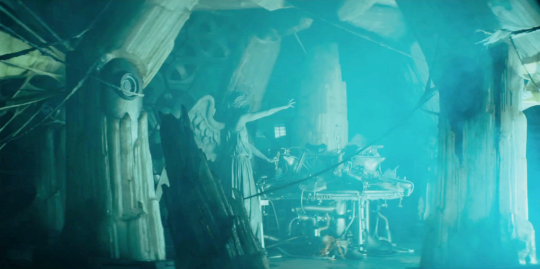
An aspect I really like about the opening scene with the Doctor is that it gave her a chance to do something clever. Rewiring the TARDIS to eject quantum entities reminded me a lot of the Fifth Doctor. It felt like something he would do. Any time the Doctor feels like the Doctor in this era is nothing short of a miracle. I’m pleased to say that we got a lot of great Doctor moments like we did in “War of the Sontarans.” I felt like the character totally did a backslide into bad habits last week. Emoting everything with huge emotion and every line expository. I had a feeling seeing her back into a simple monster of the week storyline would focus her character a bit. That isn’t to say this was a paint-by-numbers storyline. However, it does jive with my predictions about the structure of the series with one episode being a setup followed by an actual story.

The Angel may be expelled from the TARDIS, but it got the Doctor and her pals where they needed to be. We’re now back with Claire, a character from the first chapter of Flux. I rather like Claire. While I barely mentioned her in my review for “The Halloween Apocalypse,” she was one of the elements I found most intriguing. Perhaps it’s the fact that she has an interesting look about her, or the fact that she was tied to the Weeping Angels, one of the few non-Timeless Child elements of the story. Claire is being experimented on by a Dr Jericho, who is interested in Claire’s psychic abilities. Notably different is the time period from when we first met Claire in present day England, which is now 1967. This of course due to the fact that Claire had a run-in with a Weeping Angel.

One of the things I disliked when Steven Moffat brought back the Weeping Angels was the introduction of the concept that the image of an Angel becomes an Angel. I never liked this because it felt like an overcomplication of what was already an effective villain. I would rather see different stories than new powers. Sometimes I think modern Doctor Who forgets this to a degree. One of the strongest aspects to Doctor Who is how it juxtaposes completely different elements to a positive effect. If you don’t want to rehash the Weeping Angels, just change their location. You don’t need to give them new powers. I don’t mean they should never develop, they’re quantum beings after all. But it does feel as though there was always more of an emphasis on expanding their powers over creating interesting situations. Regardless, I rather liked how they use the idea of the image of an Angel becoming an Angel. Having an Angel hiding in Claire’s mind from the image of a premonition is peak Doctor Who. I’m into that. Totally.
One way I was less into the idea was the drawing of the Angel coming to life. I kind of wrote it off in my head at the time of “Well, that drawing was specifically of a Weeping Angel by someone with a psychic link.” Because I went to Sunday school and I’ve drawn some angels. I don’t think just any drawing of an angel in the Doctor Who universe is going to come to life. That would be silly. Though the EKG drawing of an Angel went surprisingly nowhere. While pushing one aspect of the Angels forward, one element that seemed like a step back was literally how little else of the Weeping Angels’ lore was actually considered. The Doctor is in a room with two other people and nobody. not even the alien Time Lord, thought to say “Let’s close our eyes in shifts.” It’s the Sontarans’ sleep schedule all over again. “You blink while I keep looking. Now I’ll blink…” Amy Pond figured this shit out immediately. This was a really bad sticking point for me throughout the episode.

The village has all come together in search of a missing young girl named Peggy. I’ll not say much about Peggy other than that she’s carrying on the fine tradition of terrible child actors in Doctor Who. After being zapped to 1901, it’s Yaz and Dan who find Peggy who was also zapped by a Weeping Angel. While there, they see Peggy’s guardians who were also taken by an Angel. This time they know better, but they totally don’t. They get too close to a Weeping Angel only to discover that you can only survive the Weeping Angels once. The result of being touched by an angel twice is that you turn into stone and then explode. Unless you’re Rory Williams and everyone else in the Winter Quay from “The Angels Take Manhattan,” where the whole point was that they kept people as batteries by sending them back through time, over and over. If you’re going to write a Weeping Angel story, you could probably stand to watch the four major Weeping Angels episodes. This isn’t like when Maxine Alderton ignored the fact that Mary Shelly was a companion of the Eighth Doctor. That was from the audios. But this was an actual episode. Come on, Maxine!

You may think to yourself “Oh damn, how are Yaz and Dan going to get out of this tight spot?” Well, you’ll be happy to know that the episode doesn’t share your concerns. The next time we see Yaz and Dan, they’re fine. I guess that Weeping Angel killed those old people and said, “Peace out.” There is a point in the episode where it mentions that the angels are cruel and like to leave a witness, but that’s hardly an explanation for letting three people live. It feels like a scene that was cut for time, which is ridiculous because you could have fit twenty minutes of extra storytime in by cutting out the scenes with Bel. I’ll get to that in a moment. Along with discovering the Weeping Angels have been sending people in this village back to 1901, Yaz and Dan also discover that this village has been ripped out of existence where it floats freely in space. That’s pretty cool I guess.

The Doctor decides to talk to the Angel living inside Claire’s head by making contact. I don’t care how I old I am, I will always get giddy at the sight of the Doctor saying “Contact!” right before sharing minds with someone. Claire keeps a gentle and breezy mind, which honestly I’m pretty jealous of. While in there, the Doctor learns that Claire has a fugitive Angel hiding in her head. The Angel is asking the Doctor for her help, which I am always into. She asks the Doctor for help, and in return, promises to tell her what the Division knows about her past. I love when the villains of the Doctor become uneasy allies. It’s like when Batman and the Joker share a laugh at the end of “The Killing Joke.” You know the peace won’t last long, but it’s a fun space to explore. While all of this is going on, poor Dr Jericho is drying his damn eyes out keeping a lookout on the Weeping Angels. I really loved returning Doctor Who veteran Kevin McNally in this role. Judging by Twitter, I’m not the only one. Throwing a cup at the Doctor to wake her from her psychic contact with Claire was the icing on the cake.
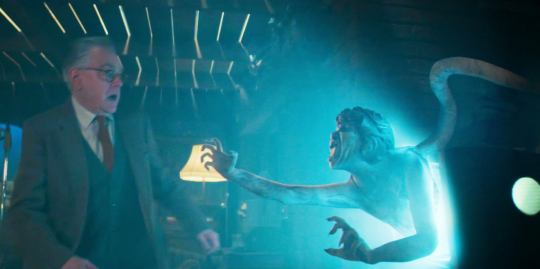
The Doctor discovers a secret tunnel out of the manor, only to find that there are Weeping Angels growing out of the walls. It’s like a game of Operation watching the Doctor and her new friends avoid reaching hands. Dr Jericho is less lucky when a bit of dust from a Weeping Angel sends him conveniently to Yaz and Dan’s location in 1901. The whole idea of the dust reminded me of the bit in “28 Days Later,” when Brendan Gleeson’s character goes rabid after a single drop of zombie blood lands in his eye. One might even say it was lifted wholesale. Another thing this does is put an end to the argument about breaking a Weeping Angel with a hammer. You’re just adding deathly dust to the air. The Doctor and Claire make it out just in time for the Doctor to understand why. They were being funnelled into a trap. The rogue Weeping Angel used the Doctor to offer her as a trade. She helps them capture the Doctor, and they leave her alone.
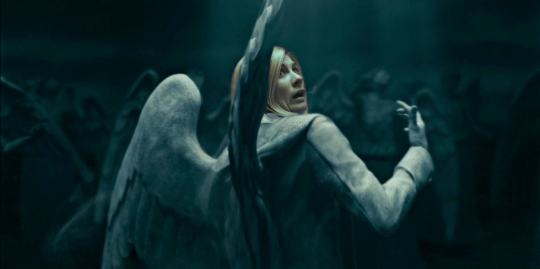
The Doctors friends, now trapped with 66 years between them, can only watch as the Doctor is transformed into an alicorn… er… Weeping Angel. You can hate the Chibnall era all you like, it’s rather warranted at this point, but that moment where the Doctor transforms will go down as one of the highlights. It truly is new territory for both the Weeping Angels, and the Doctor, so kudos for that one. I would be more excited for this development, were it not for the continuing fear that all of this is going to relate back to the Timeless Child. But there’s a whole other part of this episode that I’ve neglected to mention, and that is the Bel b-plot. The Bel-plot. My reason for this is because in between “Once, Upon Time,” and “Village of the Angels,” I read the most distressing fan theory- Bel and Vinder are the Doctor’s parents.

Usually, while watching Doctor Who, I don’t miss a whole lot. I’m invested in the story. But ever since “The Timeless Children,” my interest has waned massively. I’m no longer watching for clues or piecing together disparate pieces. I’m merely enduring the show. It’s hard to get excited when even the interesting parts of the series are in service of what I consider to be a ruinous angle for the story to take. I do not want to know who the Doctor was, and I certainly do not want to meet her parents. After the disastrous reaction to “The Timeless Children,” I am astounded that anyone at the BBC allowed Chibnall to continue down such a careless path. I’ve tried to remain positive and hopeful, but I can’t pretend anymore that continuing down the line of this horrible story only does more lasting damage to Doctor Who. Whether I can endure the show is less of a concern than whether the show can endure Chris Chibnall.
What’s ironic is that Bel and Vinder being the Doctor’s parents actually negates the arguments of people who were pro-Timeless Child. Everyone said “It doesn’t really change anything. It’s still a mystery as to who and what the Timeless Child is.” That mystery is as short-lived as its justification. We’re right back around to the idea that it is killing the initial concept of the show- Doctor who? The Doctor has gone from being a slacker who barely skirted through Time Lord academy, to a chosen child from the stars. The Doctor is no longer unique by virtue, but rather by providence. The aspect of the Doctor that makes her relatable is being replaced by a teenage fanboy’s power fantasy. I’ve said it before, and I will say it again- Chris Chibnall owes Pip and Jane Baker an apology.

It’s really a bummer to end this review like this. I liked most of the Weeping Angel storyline. But that turd keeps floating in the punch bowl, causing all of us to nurse our cups instead of swigging them down in victory. I feel like we’re past the point of good stories for Flux. My only real surviving interest in the story is seeing the TARDIS get put back to normal. I’m not implying that I’ve made up my mind, but my hope for this all to come together in a satisfying manner is at an all-time low. The word “retcon,” has been tossed around more than ever lately, and I can see why. I joked the other day that they should do as Community did with season four and just claim that the Timeless Child storyline was the result of a gas leak. The TARDIS has been sick this whole time and made everyone think the universe was suddenly devised by the mind of mad sixteen-year-old. Regardless, I hope this isn’t the last we see of Maxine Alderton.

After last week’s episode, I joked on Facebook that Chris Chibnall must have read my letters. I said this because it seemed as though “War of the Sontarans,” was a concerted effort to address a lot of the problems people like myself have been writing about for the past three years. You wouldn’t know it by reading the reviews, but a lot of fans had a positive reaction to the episode, which, in my circle at least, was the predominant response. One friend of mine asked where this Chris Chibnall had been hiding for the last two series. Most of us were in agreement that despite any reservations or Wish.com masks, the story felt like a proper episode of Doctor Who. So how did “Once, Upon Time,” fare with the same audience? Not great, friends. Not great.
It may be slightly ironic for me to imply that I go by the reactions of my friends over those of a critic as I write a review of Doctor Who. You and your friend group may have a positive reaction, and that’s fine. In my friend group, I have at least three friends whom I can talk to about Doctor Who on the same level as I think about Doctor Who. My pal Taryn and I joke that there is no one else in our lives with whom we could have a conversation about “…ish,” the Big Finish audio with a funny title. But it’s not just about people who know the show, it’s people who know the show, and aren’t also shitty about it. I started this blog to talk about Doctor Who in a positive manner. So many videos on YouTube just look like a cesspool of gatekeeping reactionaries that I often don’t find the good ones because I dare not go there. Understand then, that three years of writing about disappointment is not fun. I don’t relish this.
Reading this introduction may lead you to believe that I’m about to lay into the episode, but I’m not disappointed. I’m frustrated. I stayed up until 4 a.m. last night watching YouTube videos or talking to Taryn on the phone. My mind gets a lot of cross-chatter because I have ADHD, which is also a source of hyper focus in my life. My fixation last night that left my mind overclocked was “Once, Upon Time.” I find the episode absolutely perplexing, but not at all for the right reasons. For starters, that title? Woof. I thought I was having a stroke. It’s like one of those memes where they write “the the,” and you don’t pick up on it because your monkey brains aren’t reliable. I get that it’s a very Moffaty pun, and Chibnall loves him some puns, but it hit the part of my monkey brain that senses a typo more than the part of me that groans at puns. And to think, I thought Chibnall was getting better at naming stuff.
Puns aren’t the only things on which Chris Chibnall seems fixated. If you watch any showrunner’s era long enough you’ll start to see recurrences of their proclivities. Moffat is to women dressed like a Mary Poppins dominatrix as Tarantino is to women’s feet. But after last night, I believe I’ve pinpointed one of Chibnall’s own hyper fixations- swarms. It’s like when Bender said, “You guys like swarms of things, right?” So far in Flux, I’ve counted four different swarms. There are the weird little blue things that turn people into little purple things, there’s the Flux itself, there’s the time storm, and there’s even a dude named Swarm. If that fourth one doesn’t count enough for you, then perhaps consider the way in which he and his sister kill by turning people into little swarms of dust. Maybe Chibnall thinks swarms are cool. Maybe swarms are easier to animate on a COVID-19 budget. Maybe Chris Chibnall has a bee beard fetish. We’ll never know the true reason.
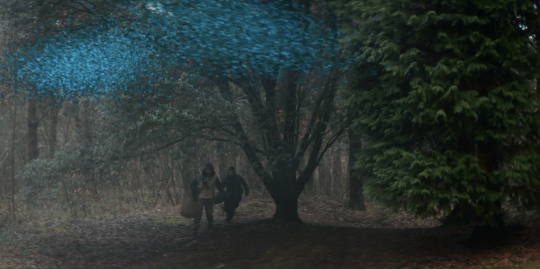
As you recall, last week ended on a cliffhanger. In wack ass fashion, it picks up just in time for the Doctor to do something. Instead of rendering Yaz into a sexy swarm of dust, Chibnall reigns in his base instincts and has the Doctor fall into a big ol’ time storm, complete with giant stompy gold ladies. Chibnall is the man who introduced both furries and vore into Doctor Who, so of course, he gave the giantess fans something to glom onto. For a guy who doesn’t understand youth culture much, Chibbers is all about that fursona. Clearly, I’m joking but it does amuse the hell out of me. Speaking of furries though, we’re given a bit of a Beauty and the Beast story in the form of Bel and Vinder. The whole thing plays out like a fairy tale, which is most likely the influence behind the episode’s title. Think about it. Vinder is exiled in a prison of his own making, represented metaphorically as a rose. Bel’s name is like Belle, and she spends the majority of her story talking to an anthropomorphic appliance. That works, I guess. Bit of a stretch?
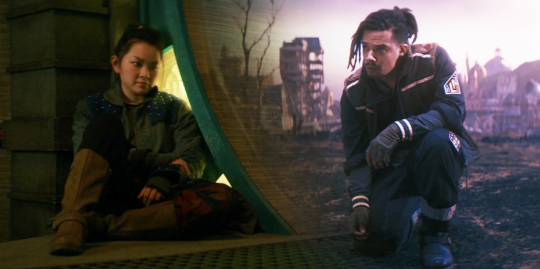
It’s been an itching sensation at the back of my mind for the past three weeks that Chibnall wasn’t writing two companions, but rather three including Vinder. Perhaps Vinder’s role was originally supposed to go to John Barrowman before all of that sex pest business. That would require the audience to fall in love with a new guy right away. I can’t think of a single character who could maybe have benefitted from a bit of that screen time. Nope. Nobody at all. We get about 20 minutes of Vinder’s backstory that tells us more about him than Yaz has gotten in three seasons. If Chibnall really has read my letters, then he definitely heard me say “Show, don’t tell.” I’m big on that concept. But did we really need an entire backstory devoted to learning about why Vinder was exiled to the Rose space station? Does anyone even really care? This is one of the few times I would have thought to say “Tell, don’t show.” The payoff for Vinder had better be worth it because the introduction of Bel throws out Yaz’s hopes of shagging. Or maybe it doesn’t. You, and Yaz, and baby, and me makes four. That’s how it goes, right?
Vinder’s whole deal is that he’s part of some freakishly loyal military on his home planet. He holds allegiance to a guy who goes by the Serpent. The Serpent’s whole deal is looking like David S Pumpkins if he went through an Ed Hardy phase. He hangs out with a couple of people who look like Sun Ra but don’t get any dialogue. During a meeting, the Serpent orders Vinder to turn off a recording device so that he may speak candidly about murder. Vinder carries a lot of guilt for having turned off the recorder, thus aiding in destroying evidence of murder. This is part of his and the other companions’ greatest hits being played out in the time storm. The Doctor protects her friends by hiding them from the Ravagers within their own lives. During this, she keeps popping into their realities to scream exposition at them while she fixes things. Seeing her floating there like a disembodied ghost made me laugh because she reminded me of Stuey Gluck from “Freaked.”

There’s a weird cartoonishness about the Doctor in this episode. At times it’s amusing, such as seeing her as a policewoman talking to Yaz. Seeing Jodie’s Doctor in a uniform of authority is like a Vincent Adultman “two kids in a trenchcoat,” vibe. And while she does momentarily, if not metaphorically, don a cool darker coat, a lot of the intensity from last week gets undercut. For starters, we lose a bit of her enigmatic nature when we hear her inner thoughts as a voiceover. The thoughts that did leave her mouth, with equal amounts of intensity were mostly exposition. You could easily have turned this story into a Big Finish audio based on how the Doctor is constantly explaining what’s in front of us. But why so much explanation when you are simultaneously showing it? It all leads back to the writing. There are too many ideas going on at the moment that none of them has any time to breathe. We need to be told what we’re seeing because it doesn’t make any sense otherwise. The best way I can think to describe it is an absolute clusterfuck.

Already we’ve seen people on social media defending the episode by attacking people’s intelligence. There’s a flippant implication that if anyone left this episode feeling confused, that it is some sort of failing on their behalf. It reeks of “Was Poop Dragon supposed to be hard? I beat him on the first try.” And like ProZD also said- “Siri, how do I delete all of Twitter?” You see, sometimes stuff is confusing on purpose, like a David Lynch movie. Or Ingmar Bergman. Or Andrei Tarkovsky. Maya Deren. Derek Jarman. Alejandro Jodorowsky. Chris Chibnall. Wait, how did he get in here? Because other times, it’s confusing on a structural level. I was able to give a decent plot synopsis above. I’m not confused by the story. It’s the pacing, the editing, the directing, and, of course, the writing.
One of the points I made in my review for “The Halloween Apocalypse,” is that Chris Chibnall seems to never know when to divulge information and to what degree. He keeps long-running plot threads looming over his entire run as showrunner which do more to frustrate than tantalise. He likes to stop the action dead in its tracks so that characters can sit and talk about their feelings. There’s a herky-jerky start-stop rhythm to his work as if he is never quite sure how far he wants to take a concept. Take the Ruth Doctor, or “Fugitive Doctor,” for instance. We really needed to see more of her at the end of “The Timeless Children,” so last night was the perfect opportunity to showcase her more. We could have finally gotten some much needed screentime from Jo Martin. While we get some decent dialogue between her and the Doctor, we missed a great opportunity to give a Doctory speech to the Ravagers. What should have happened is we see the speech start as Jodie and end as Jo. Instead, the bulk of the monologue is delivered by Jodie with flashes of Jo to remind us this is one of her memories. What should have been the best scene in the episode is undercut by the fact that they gave the bulk of the dialogue to the wrong actor.
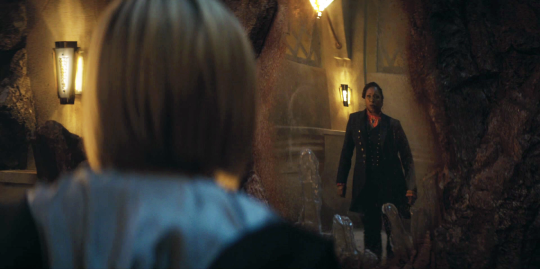
You could argue that this is the Thirteenth Doctor’s era and that she takes precedent. But she’s not really is she? It’s a symptom of the Doctor being saddled with another Doctor. Hell, she doesn’t even get her own comics. She shares that honour with the Tenth Doctor. What’s worse is the Fugitive Doctor is currently the more compelling of the two, due to her air of mystery. She embodies the Who of Doctor Who far more than Whittaker. The sad part is that it’s all leading toward solving that mystery. Leaving no question left unanswered. No room to dream. No room to wonder. The Timeless Child. If Chibnall wanted to show some real swagger, he would never fully explain her. Let us bunch of nerds argue about it as he walks away, not looking back at the explosion.
One thing we learn about the Ravagers is that they have a rather blasé attitude toward genocide. While killing one person and killing one person full of millions of people is exactly the same, visually, it does up the ante a bit. Learning that those big beefy Wish mask dudes weren’t actually security muscle, but rather walking prisons, was actually pretty cool. I joked last week that Chibnall was ripping off Faction Paradox stories, but now we’ve got people who are bigger on the inside. The reason I like this is that it was a fun idea. It’s a quick and easy way to demonstrate the cruelty of the Ravagers. Swarm and Azure get described as a sort of virus of existence. Sadly, explaining them has also defanged them a bit. As they left defeated, I wouldn’t have been surprised if they had hissed and swatted like kitty cats as they backed away. But that’s fine. That egg had to crack sooner or later.
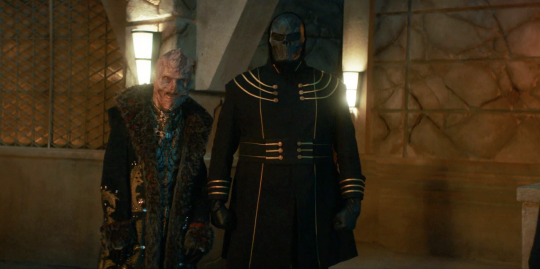
After talking the gold ladies into joining up to defeat the Ravagers, the Doctor is able to repair the triangle’s little machine that… I dunno, tempers the time storm? Is the time storm the same thing as the time vortex? Is it the same thing as the Flux? It’s hard to say. These questions have yet to be answered. Or maybe they have and audio mixing has been that bad. Seriously, I have missed at least 30% of the dialogue this season due to muddy sound design. The Doctor saves time and her companions. She very reliably pilots her unreliable TARDIS to drop Vinder off on his homeworld which was also hit by the flux. This explains why Bel experienced time fluctuations in her story, and why she was running away from Cybermen and bad CGI Daleks. What it doesn’t explain is why they tried to sell this episode as a Cyberman story. The Cybermen are so inconsequential to the story that I forgot them as I forgot about Joseph Williamson or the weird floating house. Remember the lady watering plants? She’s new! There’s just too much going on.

Mr Williamson’s addition is a rambling incoherent mess, which tracks with the rest of this story. What wasn’t drowned out by the poor sound mixing was nonsense as far as I was concerned. Also mostly forgotten are the companions. We get a bit of interest as Dan’s relationship with Diane gets explored, but it’s all a bit of a smokescreen as it’s all happening within the time storm. Even the scene we get with Yaz isn’t real, which explains why her sister claims nobody calls video games “video games.” What the hell else would you call them, Chris? Televised interactive computer programs? Or is it just “games,” now? Did you learn that from your kids, Chris? Did you come in like “Are you winning son?” while your kid is into hour 800 of Roblox and they looked at you and said “They’re called games, dad. Jeez!” He then did a kickflip and skated away. As I said, this episode is perplexing for all of the wrong reasons.
Not to go unforgotten is the TARDIS, which has mostly gone forgotten. I get that due to the cliffhangery nature of this series, the Doctor hasn’t really had the time to tend to her time machine, but yeah, it’s due. The reason for this probably has something to do with the fact that Chibnall probably wants to save this for episode six. Judging by the preview of next week’s episode, it’s going to be a monster of the week story like last week. I’m sensing a pattern. One episode is a sort of bridge episode to a normal episode. You go from a mess, to a story, to a mess, to a story. I get it, really I do. Some episodes are setups for the next episode. While “Dune,” is a great book, its follow-up “Dune Messiah,” acts as more of a bridge to get to the third book “Children of Dune.” Perhaps the Weeping Angels are to blame for what’s happening to the TARDIS. They seem to have infected Yaz’s life, why not the TARDIS as well?

These are small questions I have leading into chapter four. But unlike last week, where my interest in the story stemmed from investment, my interest now stems from confusion. I’m now watching on autopilot. I’ve lost interest in the overarching storyline and am only really interested in the possibility of the spooky Halloween episode I originally wanted from the actual Halloween episode. An episode with the Weeping Angels in a big creepy house sounds a damn sight more interesting than watching the Doctor float around and scream at everyone. The scary thought is that the Weeping Angels may have as much to do with that story as the Cybermen did with this one. I no longer trust Chris Chibnall to deliver any kind of closure in any kind of timely manner. We’re either going to learn about the Fugitive Doctor in chapter six, or we’re going to have to wait until Jodie Whittaker’s final episode. Neither would surprise me at this point.
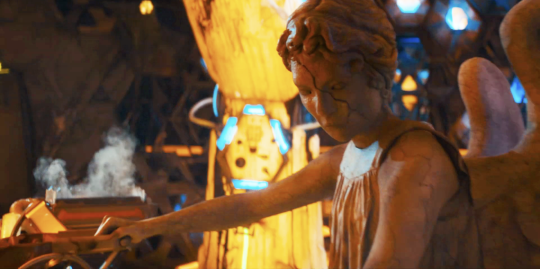
With just three episodes left, it’s easy to think we’re in the homestretch with Chibnall, but then you remember the holiday specials and that we’re only a third of the way there. I’m assuming the BBC ordered an episode of Doctor Who for their 100 year anniversary, which means we might not even see an ending to this era until October of next year. Ideally, I would like to see “Flux,” resolve not just the Ravagers storyline, but also the Fugitive Doctor. It would be really nice to be able to put a lid on this Timeless Child malarky. To borrow from John Mulaney, having Chris Chibnall in charge of Doctor Who is a lot like having a horse in the hospital. It’s hard to rest or feel confident when there’s a horse in the hospital! While it’s still ongoing, every new episode is a potentially ruinous story that could undermine the integrity of Doctor Who. Last week I would have been a little more generous. But after watching Chris Chibnall backslide into bad habits so spectacularly, I’m no longer cautiously optimistic. I’m just cautious.
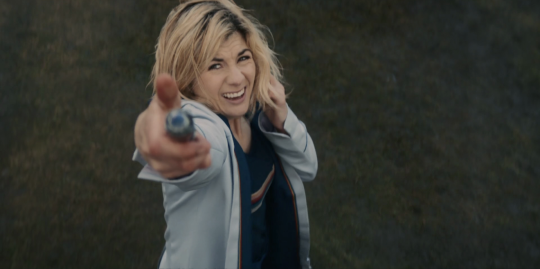
Since its inception, Doctor Who has utilised the power of the cliffhanger in an attempt to draw viewers back to the next week’s episode. This is mostly due to the stories being presented in a serialised format. The story isn’t over, but the episode is, so they needed something to entice viewers back. Oftentimes it was the Doctor or another protagonist about to meet an uncertain fate. Other times it was a big reveal, such as an alien peering out of the shadows. The problem with this format is that oftentimes the next episode would pick up right where we left off and the cliffhanger would resolve almost immediately. After being unsatisfied with how “The Empty Child,” and “The Doctor Dances,” run into one another, Steven Moffat adopted a new approach. He was quoted as saying- “My thing about cliffhangers is, it has to be a moment that changes the way you’re looking at it. It has to launch a completely different and hopefully unexpected phase of the story. It’s not just a movie cut in half.”
At the end of last week’s “The Halloween Apocalypse,” the Doctor and various other characters were facing the business end of a destructive force known as “the Flux.” Taking a page from Moffat’s playbook, Chibnall begins “War of the Sontarans,” in a completely different time and place. It’s a nice indication that while every story of Flux thus far has ended on some sort of cliffhanger, they aren’t just a movie cut in half (or sixths). Furthermore, it’s nice to see the episode had its own story arc, something of which had me worried after last week’s plotless beginning. Instead, we got a well-paced and beautifully directed episode of Doctor Who. And despite what other reviewers have said, I found it refreshing.
Once again, we’re given more moments as the Doctor and Yaz’s personalities continue to crystalise. I really enjoy Jodie Whittaker’s new approach to the Doctor. She’s more snarky, if not a little mean, but not mean in a “gives the brown guy up to the Nazis,” sort of way. She’s mean in a “talks trash and gives vague threats,” sort of way. So much of her first two series made her come off as a kids show presenter, and I’m glad she’s seemingly shed that skin for a tougher exterior. Yaz, while not incredibly fleshed out, also seems to have more of a direct personality. We’re meeting the Yaz that has taken to becoming the Doctor 2.0 in the same manner of previous companions like Rose or Martha. She’s even gone as far as to write “WWTDD,” or “What would the Doctor do?” on her hand. I can imagine that will be a bit divisive within the fandom. It’s a froggy chair moment, and no I don’t mean the one from Animal Crossing. It’s like Marmite, you’ll either like it or not. I’m team Marmite, or rather, I’m team WWTDD. Both really.
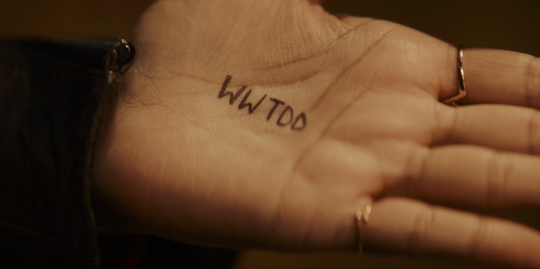
The episode wastes no time putting characters in their positions to play out like pawns in a chess game seemingly devised by the evil Swarm and his sister Azure. After discovering the TARDIS has taken them to the Crimean War, the Doctor, Yaz, and Dan are almost immediately split up. Fading away like a polaroid in a Back to the Future movie, Dan and Yaz find themselves transported away leaving the Doctor with her unreliable TARDIS. The TARDIS, still acting up, is rendered doorless as the Doctor frantically looks for a way into the safety of her phone box. Unable to swan off, the Doctor is forced to retreat from an anachronistic fleet of Sontarans. It’s around this time that the Doctor meets Mary Seacole and her “British hotel.” Chibnall’s penchant for historicals is evident at this point, but thankfully, his penchant for edutainment has not also returned. There are no moments when the Doctor stops what she’s doing to tell her companions the brief history of Mary Seacole. If “Rosa,” had ended with the Doctor looking directly into the camera saying “You can find out more at your local library,” I wouldn’t have batted an eye.
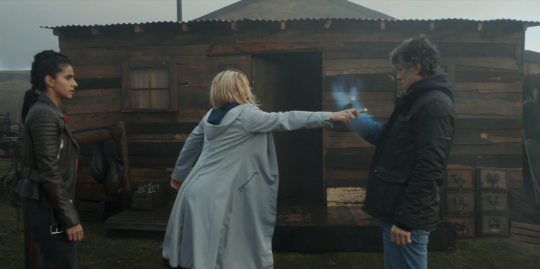
The Sontarans are back to being threatening again, but this isn’t to say they didn’t have questionable behaviour. Having slipped in through the Lupari shield just before the Flux, the Sontarans have claimed Earth as an outpost for Sontar. They did so by taking over Russia and China during the Crimean War. Like Dan and Yaz’s disappearance, it’s not really clear how or why the Sontarans or the Doctor ended up in the year 1855. The episode may have explained it, but I honestly could not tell you now. This could have something to do with the fact that the story is yet unfinished, or it could be the poor audio mixing that seems to be a theme this season. While the episode itself was nicely paced with creative direction and cinematography, the sound design was surprisingly lacklustre. Motives aside, the Sontarans of this story are on par with those of the two-part story “The Sontaran Stratagem/The Poison Sky.” It was also nice to see the return of Dan Starkey as yet another completely different Sontaran.
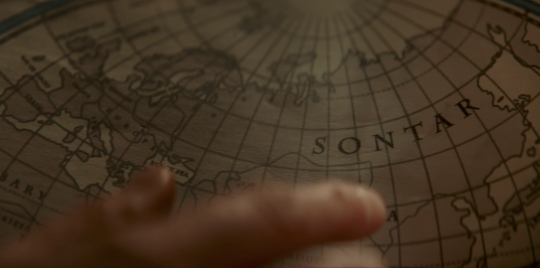
Back to the present day in Liverpool, Dan has discovered his beloved home is now the Earth capital of Sontar, but that doesn’t mean the Liverpudlians have taken this new threat lying down. Armed with pots and pans, they fight back against the Sontarans with a good whack to their probic vents. Among these rebels are Dan’s parents Eileen and Neville. If you recall, it was rumoured that Dan would be the son of a former companion, a rumour that can now be put to rest. Eileen and Neville serve up heavy Elisabeth Sladen and Nicholas Courtney from “The Sarah Jane Adventures,” vibes. Pepper in a dash of Wilfred Mott and Sylvia Noble and you’ve got Dan’s parentage. They’re a cute addition to the story that does great work to lighten the mood a bit.
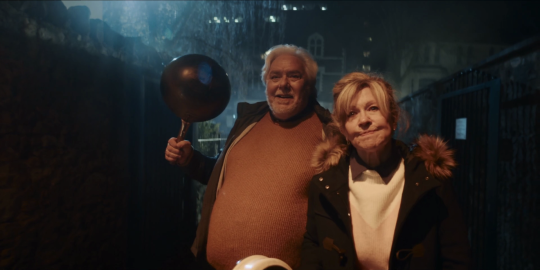
Across both timelines, the human resistance to the Sontarans fight their respective battles. Dan, armed with a wok, infiltrates a Sontaran ship, while the Doctor attempts to avoid bloodshed altogether. I liked how the Doctor uses Mary Seacole’s hotel as a sort of base of operations. Her and Mary have a nice rapport as two women trying to avoid the inevitable war between British forces and the Sontarans. I was giddy when the Doctor used her being a woman to trick the Sontarans into a parlay under the guise of having information about the male Doctor they know and fear. It took them three years, but they finally found a way for the Doctor’s femininity to take part in the storyline. Ultimately the talks fail as Sontarans would rather die than make some sort of peace accord with an inferior species such as humans.
The story attempts to portray the British soldier General Logan as a fool, but I found him to be a man stuck between two impossible choices- fight the Sontarans or let them roll across Europe for the glory of Sontar. Only after watching his battalion get crushed is he willing to hear the Doctor’s perspective. I’d also like to add that I rather liked the battle scene. A lot of the visuals of this season have been exactly what they needed to be. I saw a funny post the other day celebrating the fact that the Sontarans look like shit again, and it’s true. It’s nice to see that Doctor Who knows when to look real and when to look fantastical. In this instance, it was great to see the cameras pull back to a wide-scale battlefield. It sounded echoes of “The War Games,” which were compounded when the Doctor and her new friends discover the Sontarans are using a camouflage shield to divide the battlefield from their base of operations.

It was nice to see Mary doing some spy work, though I question the intelligence behind setting up her spy post in the exact point of a known doorway in the shield. That seems like a good way to get caught. The shots of the Sontaran base from on high stirred memories of Mordor and the witch’s castle in “The Wizard of Oz.” If they had shown the Sontarans marching back and forth singing the March of the Winkies, it wouldn’t have felt out of place. Mary learns that the Sontarans sleep for only seven minutes every 27 hours. Despite Mary’s competency and ability to adapt, I was massively disappointed when Chibnall decided in all of his infinite wisdom to have her state that she has no idea what’s going on. She may not understand the technology in front of her, but I would say she’s doing just fine for a woman who cares for a wounded Sontaran and infiltrates their base. Claiming she doesn’t know what’s happening felt like a betrayal of her intelligence and her agency. That’s a bad Chibnall!

If the Doctor’s plan sounds familiar, it’s because it’s the same plan the Doctor had in “The Sontaran Experiment.” The idea of destroying the Sontaran’s food and energy sources is exactly how they foil the plans of Field Major Styre. This wouldn’t be the first time the new series of Doctor Who used key plot points from classic Doctor Who. In “Rise of the Cybermen,” they replace the mirror planet Mondas with a mirrored universe. The plot of “The Silurians,” is ripped off wholesale in “The Hungry Earth/Cold Blood,” two-parter, also written by Chris Chibnall. Perhaps Chibnall is just Doctor Who’s reboot guy. He rebooted “The Silurians,” he rebooted the Cartmel Masterplan, and now he’s rebooted “The Sontaran Experiment.” This isn’t incredibly egregious, but I must say it does hurt the story in an unexpected manner. If the Sontaran’s major weakness is revealed in the past to be their reliance on their foodstuffs, why the hell are they all taking their seven-minute recharge simultaneously? Even idiots in horror movies know to have a guard on duty while everyone else gets a bit of kip. If you were generous, you would say it’s hubris, but it does make the Sontarans seem rather stupid.

I suppose that’s a potential pitfall in any Sontaran story. It’s easy to want to write them as stupid. They’re so serious and yet, they look so much like potato men. Moffat even went as far as to portray them as dumb enough to not notice that while their tank was invisible, they were not. So sure, why not leave yourself open to attack for seven minutes? And sure, why not keep access to their reserves at a height easily reached by humanoids? It’s not like they only protected these precious valves with a single panel that could be removed with a sonic device, the known tool of their oldest enemy, the Doctor. Oh, they did? Oh. Right. As I said above, their actions are a bit questionable. Honestly, though, I am okay with this for one reason- it gave us an ending. It was nice to see the Doctor have a plan and for that plan to play out. It may have been a bit naff, but it still felt like a run of the mill episode of Doctor Who, which, these days, is quite a lot. It makes as much sense as Donna being able to survive the atmosphere aboard a Sontaran ship. Just go with it.
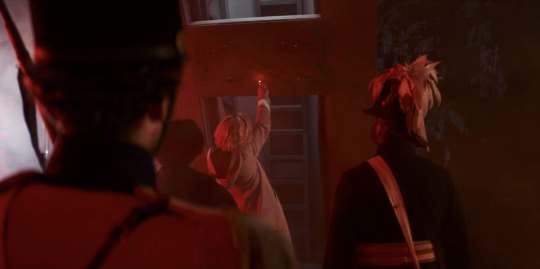
Dan and the Doctor’s adventures conclude in similar fashions- with giant explosions. One orange, one blue. On the Doctor’s end, it’s at the hands of Logan who blows them sky-high with barrels of gun powder. The Doctor admonishes him, but I have to admit, from his perspective, I once again understand his actions. Sure, she can send the Sontarans packing, but Logan can’t take the chance that they might come back. Like Captain Magambo in “Planet of the Dead,” his main concern is for the human race. The Doctor won’t always be there to save humanity. While I don’t stan General Logan, I do understand his motivations. On Dan’s end of things, he and his new Lupari friend, Karvanista, destroy the Sontarans with a sort of temporal bomb. How this bomb actually functioned was a load of bafflegab, but it certainly did the trick. It may be a bit a cliche at this point to end a Doctor Who episode by putting everything back in its place, but I don’t mind, personally. It seems within the realm of a time travel show that you could remove all traces of a thing using time travel technology.
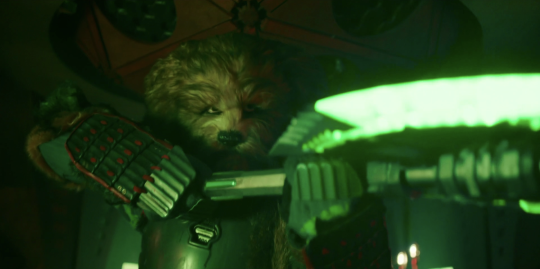
Speaking of time travel technology, we are now getting a clearer picture as to why the TARDIS has been less than reliable. It would appear that the black goo we’ve seen dripping from her columns is some sort of corruption. Perhaps Swarm and Azure are using it to pilot the TARDIS to their location. Either way, at the moment it means the Doctor is no longer able to rely on her constant companion. I don’t quite understand the motivation here as the show has never really needed a reason for the Doctor not to use the TARDIS at every opportunity. Sure, there are times when the TARDIS takes a plunge into the odd Satan pit, but usually, they just have the Doctor not use the TARDIS. Because let’s be real, if this wasn’t a fictional show, there would be no reason not to use the TARDIS all the freaking time. Got Daleks? No problem. Materialise around them and drop them into the sun. Easy peasy. See? That would be very boring.

Not to be forgotten, Yaz has now met up with Vinder. The Flux has deposited Vinder to the same location as Yaz- a planet called Time. On this planet, a group of monks or priests in the form of floating triangles have conscripted both of the young heroes as repairers. They need their circle of witches machine fixed, for some reason. We’re also met once again by the character Joseph Williamson. Williamson is the same guy I forgot was in chapter one, who seemed to be running the weirdest dig site ever. This time he’s seen rambling in the corridors of this temple known as the Temple of Atropos. Is it just me or has Chibnall gotten better at naming stuff? Atropos is a far cry better than “Ranskoor Av Kolos,” a name of which I constantly have to look up. Even Lupar and Karvanista are decent names.

The Swarm and Azure sequences give me “Kinda,” vibes. They take a sort of relish in menacingly chewing scenery that reminds me of the Mara. However, I would be remiss if I didn’t point out just how many similarities I see between this series of Doctor Who and the MCU. Perhaps it was unavoidable when “Loki,” introduced the concept of the Time Variance Authority. But having an extremely powerful villain that uses a giant destructive cloud that eats everything in its path reeks of Kang the Conquerer. Especially when said bad guy casually avoids death by zapping from place to place as if already knowing where the killing blow will land. People joked about how close Vinder’s appearance was to that of Michael B Jordan’s “Killmonger,” from “Black Panther,” but maybe they were onto something?
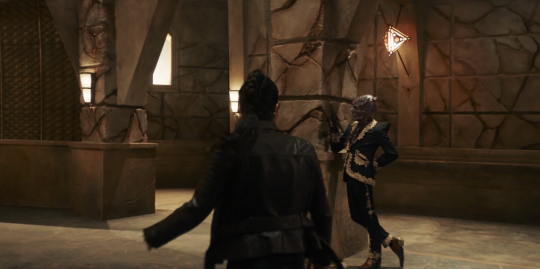
As much as I have enjoyed the performances of both Azure and Swarm, I find them to be the most worrying aspect of the storyline. I can’t shake the feeling that their story ties into the cringe-inducing Timeless Child storyline. When they mentioned that “Time” is a planet, I began to worry that Chibnall was up to his worst inclinations. But I’m also trying to be open-minded, so I am also allowing myself room to be pleasantly surprised. I think a lot of people think Chibnall’s detractors want to see him fail. I want Chris Chibnall to succeed. I want Doctor Who to be good. If I want Chibnall to fail in any manner, it would be for him to fail in ruining the show. I want him to succeed at keeping the show afloat. I want him to fail at running it into the ground. Who the hell would like to see Doctor Who be bad?

One aspect I found really interesting about the storyline is where it was revealed that the circle of time guardians was purposely “broken.” These “Mouri,” are quantum locked, seemingly to keep Swarm and Azure from being able to harm them. Why this is interesting is that, up to this point, the only things that are quantum locked in Doctor Who are the Weeping Angels. Seeing as “Flux,” has already incorporated the Weeping Angels into the storyline, I can’t help but wonder if we’re not going to get a sort of origin story for them. I know Rassilon condemned the dissenting Time Lords to be like “the Weeping Angels of old,” but that doesn’t really mean that’s where they come from. I would be interested in such a storyline. And while the idea of the baddies ripping apart time makes me worry that Chibnall is still trying to do lasting damage to the show, it could also be a lot of fun to see what comes of it. Azure and Swarm seem to revel in toying with time that echos the Faction Paradox. Hopefully, they’ll be even a fraction as good. Chibnall decided to borrow from Andrew Cartmel to disastrous ends, so why not Lawrence Miles? I kid.
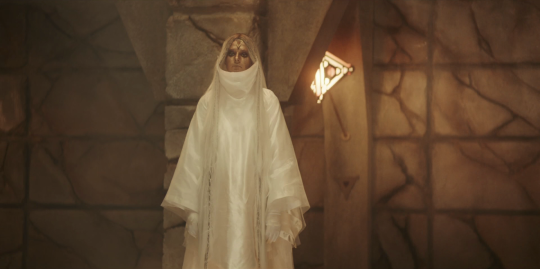
As I said, I enjoyed this episode. It might even be one of my favourite Chris Chibnall stories overall. Dan continues to charm, though I hope the next thing he does with his wok is cook a damn meal. At this point he’s gone from work, to capture, to a battle, and not a single banger or tattie to tide him over. That man needs a kebab like Commander Skaak needs to ride a horse! While the episode is by no means perfect, it met my number one criteria- it was fun to watch. Any story can be picked apart and held up to harsh light, but storytelling isn’t real life. I told my good friend Taryn that even if this series goes down as one of the worst in the show’s history, that this episode would be worth revisiting. There aren’t many episodes in the Chibnall era that I would like to revisit, save for maybe “The Witchfinders,” or “It Takes You Away,” but this one I could return to. What’s more, is that it doesn’t need a hokey cliffhanger to entice me back for the next episode. At this point, I’m invested.

In the past twelve days since my last update, I have been dancing around the idea of writing a follow-up article. While I think it was fairly obvious how I felt leading up to series thirteen, I felt as though I hadn’t quite captured what I was trying to say. To be honest, I didn’t enjoy writing about how unenthused I have been for more Doctor Who. It’s not a great feeling, furthermore, I dislike the idea of adding to the vitriol on the internet. Despite my reservations, I kept coming back to one question- what if we’re wrong? What if all of this is leading somewhere exciting? Ultimately, I decided against the article as I felt that it would not be long enough to justify writing it. But the question persists. It wasn’t until last nights episode when I finally was able to put into words what’s been bugging me- one of Chris Chibnall’s biggest failings is also the thing that keeps me returning.
“The Halloween Apocalypse,” starts with a bang. I want to say that upfront. I loved the Doctor and Yaz’s banter. Both Whittaker and Gill seemed to be having a great time. The special effects were pure cheese like something from a Power Rangers episode, and I appreciated the effort. Seriously, I loved how dumb it was. Because first and foremost, the one thing I’m looking for from Doctor Who is that it be fun. The Doctor and Yaz hanging over a pit of acid is daft, and cute, and fun. I also liked that the Doctor even somewhat planned everything to the point of setting up a trampoline to catch her and Yaz. That moment gives the Doctor some agency and makes her feel a bit crafty and for lack of a better word- Doctory.

I also really loved seeing Yaz with some much-needed personality. It almost illustrates immediately that maybe three companions was too many. Since we last saw her, Yaz has been given a little bit of a shot in the arm. She’s no longer with the police, and she’s fallen into a groove as a companion. I was reminded of Rose’s character arc wherein she goes from a young shopgirl to a Doctor in training. Yaz is shown punching buttons and giving directives. There seems that she has been given a more definitive character, and I am hoping that it doesn’t disappear in chapter two like Ryan’s dyspraxia. If it can remain consistent, I will be very excited.

Along with Yaz’s characterisation, it feels as though we’re finally seeing Jodie Whittaker’s Doctor take a little more form. I liked seeing her being a bit more assertive and comfortable with herself. There was a bit where her weird morality comes into play where she talks to Yaz as though showing her wondrous things excludes her from having to be honest. It felt a bit like when the Doctor failed to meet even the most basic of requirements for comforting a friend afraid of having cancer. But on the other hand, it reminded me a bit of moments when the Tenth Doctor threw his weight around and acted selfishly. I’m ok with the Doctor not being a great person, so long as the writing understands the implications. This seemed ok to me.
The problem I had with this episode, I now realise is the problem I’ve had with all of Chris Chibnall’s era of Doctor Who- there’s not a lot of resolution to be found anywhere. Clearly, the first episode of a greater six-part story is allowed to end on a bit of a cliffhanger, but on its own, very little happens. It’s a lot of set-up for chapter two. I only hope that chapter two isn’t, in turn, a lot of set-up for chapter three. You see, we’ve been given a lot to go off of, but very few postmarks that allow us to trace our journey. Yes, we’ve met the Ruth Doctor, but who is she? Is she even actually the Doctor? The way in which the Doctor side-eyes her in “The Fugitive of the Judoon,” makes me wonder if she might not be the Doctor. Everything thus far has been a lot of promise, with not a lot of payoff. We should have learned more about the Ruth Doctor by the end of series twelve, but we were only left with more questions.
Not even the resolution of “The Timeless Children,” elucidated much for us as the audience. Nothing about the storyline played into the action beyond being an info dump. Compare this to the end of series four. Throughout all of series four, we’re constantly hearing about planets that have gone missing. It’s such a basic science fiction trope that you’d barely even notice it as it’s happening. Of course, the Adipose breeding planet went missing, that’s the kind of thing that happens in sci-fi. Davies took this basic trope, seeded throughout series four, and built it into one of the best series finales. Not only had these planets gone missing, but they were also being used by the Daleks to create the reality bomb. The most the Timeless Child does to inform the story is to give the Master motivation to destroy Gallifrey. Knowledge gained in this way doesn’t further a plot, it just vomits information at us.

I feel like a lot of Chibnall’s writing would go over better if he gave the audience more moments of resolution. It reminds me a lot of Trenzalore, a concept drawn out by Steven Moffat to the point where it became more annoying than intriguing. Just tell the story you want to tell, stop implying that we’ll get there someday. Davies wasn’t afraid of peppering in clues or hints, but they all led to a finale. Both Moffat and Davies understood that while you could tell an overarching plot, each individual episode had its own sort of arc. They would leave room for further intrigue, while still giving us clear resolutions to individual episodes. In this way, the structure of “The Halloween Apocalypse,” worries me. It’s about the dissemination of information. I mentioned in my last article that I figured one episode would be the Weeping Angels episode, and one would be the Sontarans episode, and while they would be a part of a greater story, they would also stand alone as individual stories. What we got instead was an hour of set-up. I was looking forward to a spooky Halloween episode filled with Weeping Angels, but instead, we got a glimpse at the Weeping Angels and a mountain of exposition.

This seems to be a recurring problem in Chibnall’s writing. Not knowing when to give information. Not knowing when to let something be its own story. Take “Revolution of the Daleks,” for instance. We get a pretty good concept of the UK government using Daleks as the police and another good concept of the Doctor’s prison break. Both concepts could have been an episode on their own, but are instead dropped together in the same story. The consequence of which is that neither story is properly explored. “The Halloween Apocalypse,” suffers from this lack of breathing room. So much information is dropped up front that by the end, you feel more overwhelmed than informed. And look, I get it, if you’re constantly being called the boring guy, you would want to put as much excitement and promise into that first episode as possible. That’s totally fair, but I know I’m not the only one who felt overwhelmed by the info dump. The fact that the sound mixing was muddy didn’t help either.
The closest thing we’re given to a plot is in the form of newcomer Dan’s run-in with Kavanista, a Lupar soldier who could best be described as a Chewbacca-spaniel. The Doctor and Yaz have been pursuing him so the Doctor to could learn more about her past. As it turns out, Kavanista’s mission is to rescue Dan from the Flux, a devastating force in space, threatening to wipe out the entire universe. The Lupar race is evidently a kind of companion race to humanity, and each of them has been assigned a human to protect from the Flux. Their big plan is to wrap the planet earth in a network of ships like they were the Nova Corps. I think. Don’t quote me on that. How their ships could handle the Flux where whole planets failed is anyone’s guess.

My current theory is that the Flux is somehow related to the new baddies in town- Swarm and Azure. As villains go, they’re not bad. There’s not a lot to go off of this early. Swarm has been imprisoned since the beginning of time but has spent the entire time planning and growing. He reveals himself to the Doctor while revelling in the fact that she doesn’t remember them. One can probably assume that he’s the reason the Doctor doesn’t remember being the Ruth Doctor, which is not exactly exciting as it all ties back to the Timeless Child, a storyline in which I have consistently shown very little interest. My initial reaction to Swarm and his sister Azure is that they feel a lot like Chris Chibnall took Tzim-Sha and mashed him up with the Eternals from “Can You Hear Me?” Swarm stands out, however, due to the strong performance given by Sam Spruell.

Throughout the episode, I was struck with the feeling that Chibnall was trying to evoke the experience of a classic Doctor Who serial. Oftentimes, classic serials would opt for a cliffhanger episode leading into the next. You could go a whole six weeks for certain elements to resolve. The difference is that the old serials didn’t also drop close to every possible story arc in the first episode. They allowed the story to tell itself slowly, over time. I’m willing to give that a lot of good faith, however, mostly due to the reasons I’ve already stated above. The main reason is that it’s only chapter one. That being said, I would have liked to have seen some of these story elements spread out a little more. Even “Game of Thrones,” with its many characters and plotlines took the time to parse out the information. As I said, I hope episode two is allowed to be a story arc on its own.
Speaking of Game of Thrones, one of the elements that worked the least for me was the inclusion of the character Vinder. From the space station “Rose,” Vinder is either stranded or maybe even exiled from his people, out in deep space. Vinder’s main role in the story is to passively watch as the Flux passes through and destroys planets in its wake. This is all fine and good, but I couldn’t for the life of me understand how fast the Flux moves. It appears to be engulfing planets around Vinder left and right, but never really encroaching on him or the space station. Vinder’s actual location in relation to the Flux is never quite clear. You think at times that he is about to die, but then the Flux seems lightyears away. Yet simultaneously it destroys planets all around. It reminded me a lot of when Whittaker’s Doctor bumps her hip to send her sonic screwdriver inexplicably into her hands, defying all laws of physics. The portrayal of Vinder and his position in relation to the Flux is poorly defined. I’m not even sure when or where Vinder is, but hopefully, that will come with time.

Judging by the movement of the Flux and the size of the universe, the human race has anywhere between 5 minutes and 75 billion years before it utterly annihilates the earth. It’s hard to tell, because, you know, space is massive. The Doctor pilots her TARDIS to Halloween, the day on which the Flux arrives to Earth. This comes after some weird behaviour on the TARDIS’ behalf. I really like the idea that the TARDIS is possibly dying. That’s a very cool concept for a story. My only fear stemming from that storyline is that they may use it as an opportunity to replace the TARDIS. Why this worries me (beyond the fact that the TARDIS is an institution and a character in her own right), is that I’m nervous they’re going to use this as an opportunity to replace the blue box. There have been really dumb rumours that they may change the police box because police aren’t that popular these days. Doing so would not only fix a problem that never existed, but it would also be the ultimate act of performative wokeness. Seriously, nobody wants that. The part of that storyline that is interesting to me is in seeing how the Doctor might save the TARDIS. It’s ok to put the TARDIS in peril, but at the end of the day, it’s not ok to kill her. Even Steven Moffat knew he couldn’t actually say the Doctor’s name. Some things, no writer has the right to change.

Next week is looking like it’s going to be the Sontaran episode. My hope for stand-alone stories may yet be fulfilled. Though we didn’t get our spooky Halloween episode, which was a major disappointment, we may still get some good self-contained episodes. As an American, I have always wished they would do a Halloween episode. I figured it would never happen as Halloween isn’t as big a deal here in the UK. It’s funny how Chris Chibnall seems to give me things I’ve wanted to see in Doctor Who, but his execution is so often lacking. I was hoping that they were going to try and add a little menace to the Sontarans, but instead we got more of the painfully unfunny humour about their appearance from the Moffat era. Sigh. You would think a Sontaran would wear his battle scars like a badge of honour, but here it’s a source of derision. It’s a disappointing choice, that, but I guess he’s trying to lean into what’s popular.

There’s a lot of setup in this story, culminating with the Doctor looking deep into the Flux, about to die inside an unreliable TARDIS. It’s not a bad place to be considering my attitude leading up to the episode. Obviously, some of my previous concerns remain, but most importantly, I had fun. Watching the Doctor and Yaz hold onto rockets like witches on brooms was a genuine delight. I also loved the Doctor hitting the Flux with the might of the time vortex only for it to do nothing. It nicely illustrated the inherent threat of the Flux. While I’ve not said much about him, Dan is a very sympathetic person. John Bishop’s accent may be a bit of a put-on, but he’s so damn charming that I hardly care. Lots of the acting was very strong. Much like Bradley Walsh, I feel as though both John Bishop and Sam Spruell are going to elevate what is on the page. This is a better place than where a lot of people are with the show at the moment. My friend Taryn told me that the only solace she has in the Chibnall era is that now there is an end in sight. She compared it to waking up three-fourths of the way into surgery and thinking “Well, at least it’s almost over.” It hurts, but it won’t hurt forever. For me, however, the most notable difference between my feelings before and after this episode is that now, I’m actually looking forward to the next one. Considering my pessimism just twelve days ago, that’s a hell of a turnaround.

One of the bits of writing advice you hear the most is “Don’t write about not knowing what to write about.” It’s good advice when you consider just how self-indulgent pieces like that can be. Unless you’re Charlie Kaufman, it’s best to leave it alone. But what about when the lack of inspiration is a genuine reaction to something? For the last two series of Doctor Who, I have written articles before each of them aired. In said articles, I speculated about the rumours, casting choices, and changes in the production crew. But leading up to series thirteen, I find myself hard-pressed to care about much of anything. My anticipation for new Doctor Who is at an all-time low, and I’m not the first person to say this.
If you go back and look, you’ll see that I have been more than fair to Chris Chibnall’s vision of Doctor Who. Possibly even more than it deserves. I always try and take an optimistic stance toward Doctor Who because, at the end of the day, I do want to enjoy it. History has shown us that Doctor Who has its ups and downs. Even within bad eras, you will find the occasional gem. These gems make sorting through the rough worth it. However, a number of my friends have said to me that they have no plans of watching until the Chibnall era has passed. These are people who survived “The Twin Dilemma,” and intimate relations with pavement stones. It would appear then that “The Timeless Children,” has done lasting damage.
With my series eleven preview, I speculated about what a Chris Chibnall and female Doctor dynamic would look like. In my series twelve preview, I talked about the strengths and weaknesses of series eleven and how they could be improved upon. But going into series thirteen, I haven’t much to say other than “I’m glad it’s short,” which is something I would have never expected to say about Doctor Who. Thank Ood that it’s only six episodes long. However, considering the damage that can be done to the history of Doctor Who with one episode, six seems almost too many. But this has been a tradition for the last two series, and therefore I will continue with tradition and give you my impressions leading to series thirteen.
Chris Chibnall

It’s genuinely hard to care about Chibnall at this point. He claims he always planned on leaving after three series, but his lack of a plan for series eleven makes his claim dubious at best. The fact that they have already wrapped filming on his 2022 specials reeks of having been sacked. The BBC just wanted him gone. My only hope for him at this point is that the BBC have done damage control. You get the impression that the BBC is aware of the damage he has done to the show’s history. You don’t break out Russell T Davies when the show is doing well. Clearly, there is a desire for a return to form. At the same time, bringing back RTD also shows the same lack of understanding for the property that got Chibnall hired in the first place. The BBC doesn’t seem to know what works about Doctor Who, but Chibnall looked good enough on paper. They don’t know why RTD was successful, only that he was successful.
Aside from betraying the mystery implied in the show’s title, Chibnall broke one of the biggest cardinal sins of being a showrunner- being boring. I imagine even his parents call him “Chibnall.” I’ll give the man credit that you can tell he actually tried to make series twelve more exciting and even succeeded in places. But this is also the man who managed to make dinosaurs in space and giant spiders boring. I would venture to say that what makes Chris Chibnall’s writing so boring is how utterly depressing it can be. His version of Doctor Who is clearly Broadchurch with a Doctor Who skin. For a man who seems to think he is expressing open-minded and liberal opinions, he’s actually fairly mean spirited with his writing. He’s going to portray gay characters long enough to kill them. The Doctor speaks out against guns in favour of bombs. She even sells a brown man out to the Nazis. In Chibnall’s Doctor Who, man is the greatest monster of all, and it’s tired as hell.
In my time as a Doctor Who fan, I can think of at least five occasions where I have reacted to the show with emphatic cheering. I cheered when the Eighth Doctor showed up in “The Night of the Doctor.” I cheered when the Twelfth Doctor’s eyebrows made an appearance in the 50th anniversary. I cheered at the announcement of a female Doctor. And I cheered when it was announced that Chibnall was leaving and again when I learned his replacement would be Russell T Davies. Doctor Who has fallen so low that its highs are no longer found in narrative triumphs, but in firing bad writers. The only real joy we have left is knowing that there is an end in sight.
Chris Chibnall promises to “blow up the universe,” in episode one. I find this claim weird because he already effectively did that in “The Timeless Children.” Every promise he makes feels like more of a threat. He’s done so much lasting harm to Doctor Who that at this point, less is more. Each episode under his watch is yet another possible disaster in the making. I would take no Doctor Who over more of his Doctor Who. Seeing set photos of RTD and the Fourteenth Doctor would be more exciting to me than anything Chibnall has planned. Most everyone I know is more excited for the return of Russell T Davies than the return of Chris Chibnall. Series thirteen feels more like something to get past rather than experience. My only real hope from his remaining episodes is that he leaves quietly.
One Season One Story

The pandemic has given Chris Chibnall the ultimate excuse to churn out even less Doctor Who than usual. Already they had been reducing the number of episodes and the frequency at which they were produced. Now we’ve got what is essentially one story spread among six episodes, and I don’t know if that’s a good thing or a bad thing. It’s closer to classic Doctor Who with its serialised format, but with fewer stories overall. The closest thing we have to compare it with from modern Doctor Who is series nine where the episodes were mostly two-parters. Consequently, I find myself returning to series nine the least. I don’t always have time to dedicate to two episodes. Combine that with subpar writing and I’ll probably never return to series thirteen again.
From what I can tell from the trailers is that some episodes may focus on one baddie at a time. There’s the chance that one episode will be dedicated to the Sontarans and the next to the Weeping Angels. Maybe the only way Chibnall can understand the concept of a season arc is to refer to it as a single story. Whatever gets you there in the end, Chris. The real issue I have with “Flux,” being one continuous story isn’t really that it’s fewer stories, but rather that it means more Chris Chibnall. It’s been revealed that every episode has been written by Chibnall himself - a man whose name on the title screen is as welcome as a positive result on a COVID test. Only episode four offers a possible respite from Chibnall’s cruel brand of Doctor Who in the form of co-writer Maxine Alderton. Even so, the episode is still co-written by Chris Chibnall, so my expectations are still rather low.
Dan the Companion Man

The introduction of John Bishop’s “Dan,” has never excited me. I was excited to see Yaz and the Doctor alone for a change. Finally, we were going to get to see some much-needed character development for Yaz, but no. Part of me wonders whether the inclusion of Dan stems from BBC execs worry that the complete lack of a male presence in the TARDIS would further alienate the misogynist portion of their audience. It’s some small brain energy and I’m not there for it. This isn’t to say John Bishop is going to be good or bad. I know nothing about the guy. He’s a blank slate at this moment. I just find the move cowardly.
One aspect to Dan’s character that I’ve heard rumoured is that he’s supposedly the son of a previous companion. My initial guess would be probably Jo Grant. Under another showrunner, this concept might actually excite me. But under Chibnall, it’s yet again another promise that feels like a threat. Instead of being just another companion, Dan threatens to be an element that could retroactively tarnish a pre-existing companion. Not an auspicious start for Dan, sadly. I’m sorry, John Bishop, it’s not your fault. You inherited this mess, possibly in more ways than one. It’s not your fault that you’ve been yoked with one of the worst showrunners in Doctor Who’s history. As the Thirteenth Doctor effectively said to Graham’s cancer concerns- “Sucks, brah.”
Returning Classic Baddies

When Chris Chibnall threatened before series eleven that there would be no classic baddies returning, it felt like a misstep. Certainly, series eleven suffered from a deficit of memorable villains. But now, much like Dan, the inclusion of classic baddies feels more like a threat than a promise. While I think the redesign of the Sontarans looks cool in its throwback to the classic series, I also think “Oh goody, now he can ruin the Sontarans too.” We also get the return of the Weeping Angels, who have never gotten better through more development. Even Moffat struggled to make them more effective than their first appearance in “Blink.”
However, I find myself slightly hopeful in one respect. The redesign of the Sontarans looks as though Chibnall is interested in re-establishing them as dangerous again. One of my complaints with Moffat’s Doctor Who was how he constantly undermined the threat of villains. Perhaps Chibnall could restore a little menace to both them and the Weeping Angels. This is, of course, hoping against hope, but like I said, I want to enjoy Doctor Who. I will try and remain as fair and optimistic as possible. However, if the rumours of the return of Davros are true, I worry then that Chibnall lacks the gravitas required to capture what is good about the character. If he can’t get the Doctor’s morality right, I doubt he can nail Davros. We’ll see I guess.
Publicity

One of the most undeniable facts of the Chibnall era of Doctor Who has been its lack of promotion. The number of books and merchandise have plummeted. Webisodes are at zero. Not even Doctor Who Magazine was doing the comics properly. It was nice to see the lead up to series thirteen’s trailer marked with little clues within emails. Over the last couple of weeks, we’ve seen glimpses of the Doctor glitching into advert bumpers on BBC. All of these have been nice little bread crumbs for a show that has gotten surprisingly little coverage over the last couple of years. The BBC doesn’t seem to know what to do with Doctor Who lately, so anything has been better than nothing. Their faith in the Thirteenth Doctor is so low that they don’t even allow her to have her own comic book without also inserting the Tenth Doctor at every chance they can get.
On top of the lack of promotion, the promotion we have gotten has all been rather lacklustre. Shots of Jodie Whittaker doing the hands out Doctor Who pose in front of a colourful background has been the norm for all three seasons. The promotional image for Flux is somehow even more boring. I will say, however, that the new trailer for series thirteen has gotten me mildly excited. The shot of the battlefield, in particular, has caught my interest. I’m wondering if Chibnall isn’t returning to the War Games from the Second Doctor era. And yes, that does worry me in the same way Davros and Dan worry me, but it also piques my interest, which is something. I’ll take any point of interest over any feelings of dread. I, like you, would like to enjoy Doctor Who despite who is writing. Sometimes the actors and the production crew can elevate substandard material. Sometimes things are just weird enough to be fun. With series thirteen my plan is to hope for the best and brace for the worst.


Rare photos of John Bishop via chuckyholic on IG
Some of my fave photos from S13 filming in Liverpool over the last week








BIG SPOILERS BELOW
-
-
-
-
-
-
I have so much to say about that episode but seeing as we’ve been completely blindsided by the announcement of a new companion I can’t really think of anything else but that rn

What does everyone think of our new companion Dan?
From seeing people’s reactions so far feelings definitely appear to be mixed and I can’t help but agree.
I’m excited. I love how a new companion has the ability to refresh the show and shake up the character dynamics and adds an element of mystery that we can all theorise about. From the breadcrumbs that we have been handed I get the sense that he has the potential to be really fun so I’m definitely intrigued to see where this goes.
HOWEVER, whilst this is absolutely not the fault of John Bishop himself for being cast in this role, nor is this something I feel that I can really hold against a character, the concept of a Thirteen and Yaz TARDIS team went beyond simply refreshing the show. For the first time in 57 years we could have had an all-female TARDIS team, one without a white male. We could have finally seen two female actors leading the show, one of which being a POC character. Doctor Who means a lot to so many people and this era has already been one that represents bold decisions, evolution and representation so I suppose the underlying feeling amongst a lot of people is disappointment. It has very little to do with the character or the actor that plays Dan, but more to do with the influence that the show carries and the message that it could have portrayed by choosing to let such an institution in television be headed by two women. Chibnall of all people seemed to be someone who would have done such a thing so it’s almost a shame that it hasn’t happened.
What I’m also worried about is to what extent this is going to hinder Yaz’s character development. Something that I think a lot of us were looking forward to was the way in which her character would finally have room to shine and develop on screen, room that she clearly wasn’t being given before. We’ve seen this this is possible in Revolution of the Daleks but I just hope that through introducing and establishing this new character of Dan , we aren’t going to see Yaz sidelined again as she used to be. If Chibnall can find a balance between two companions and The Doctor, then I will have no complaints.
It’s a difficult one. That all being said I want to try and not hold this over S13 and the character of Dan too much. All of these concerns are definitely valid but I will always go forward with an open mindset. I’ve never judged a character before they’ve appeared on screen in the show and I’m not about to do that now.

